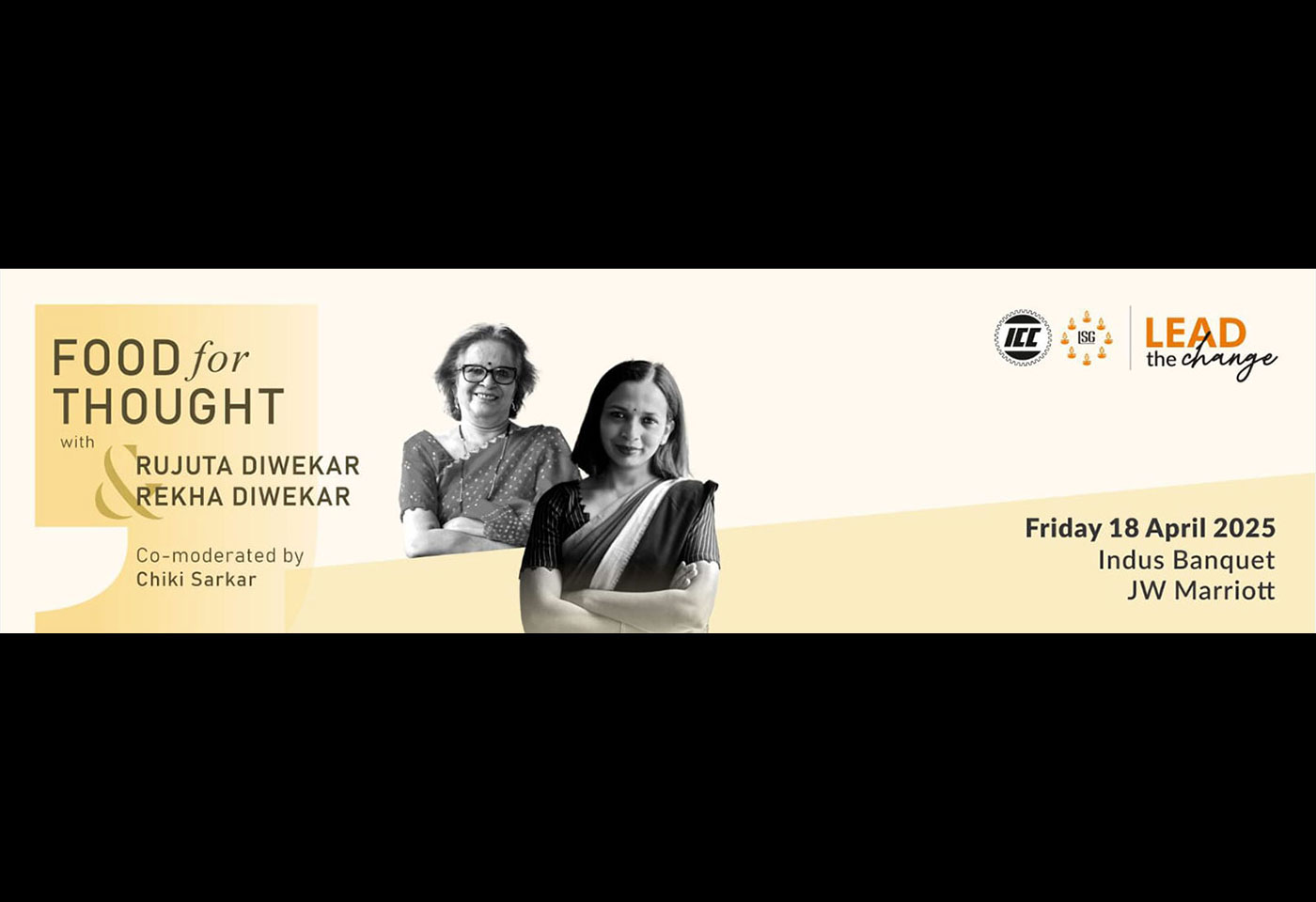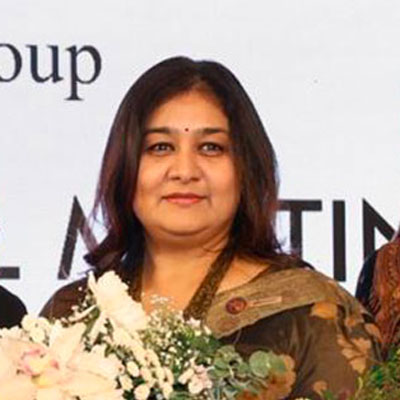
Speaker: Human Rights Advocate Ms Shreegauri Sawant
Venue: The LaLiT Great Eastern, Kolkata
Ladies Study Group (LSG) hosted the LSG Charitable Trust Annual Award Ceremony 2025 on 15 December 2025 at The LaLiT Great Eastern, Kolkata, bringing together members, guests and changemakers for an evening of reflection, recognition and dialogue.
Ms Richa Agarwal, President (2025-26) LSG, spoke about the need to move beyond intent and create meaningful spaces for learning from voices working on the ground. This philosophy was embodied in the presentation of the LSG Charitable Trust Annual Award 2025 to Destiny Foundation, Kolkata, for its dedicated work with survivors of human trafficking through its Educate–Employ–Empower model.
Chief Guests Ms Sanghamitra Ghosh, Principal Secretary, Women & Child Development and Social Welfare, Government of West Bengal, and Dr Anuradha Lohia, Chairperson, Manovikas Kendra, in their addresses highlighted the complex realities of trafficking, the need for systemic vigilance and the moral courage required for sustained social engagement.
The Ceremony was followed by a talk titled Against All Odds: Redefining Inequality and Inclusivity by transgender activist and human rights advocate Ms Shreegauri Sawant. She shared deeply personal reflections on identity, exclusion and motherhood, challenging the audience to re-examine societal notions of equality, acceptance and compassion.
The evening concluded with a collective reaffirmation of LSG’s commitment to social equity, education and inclusive change.
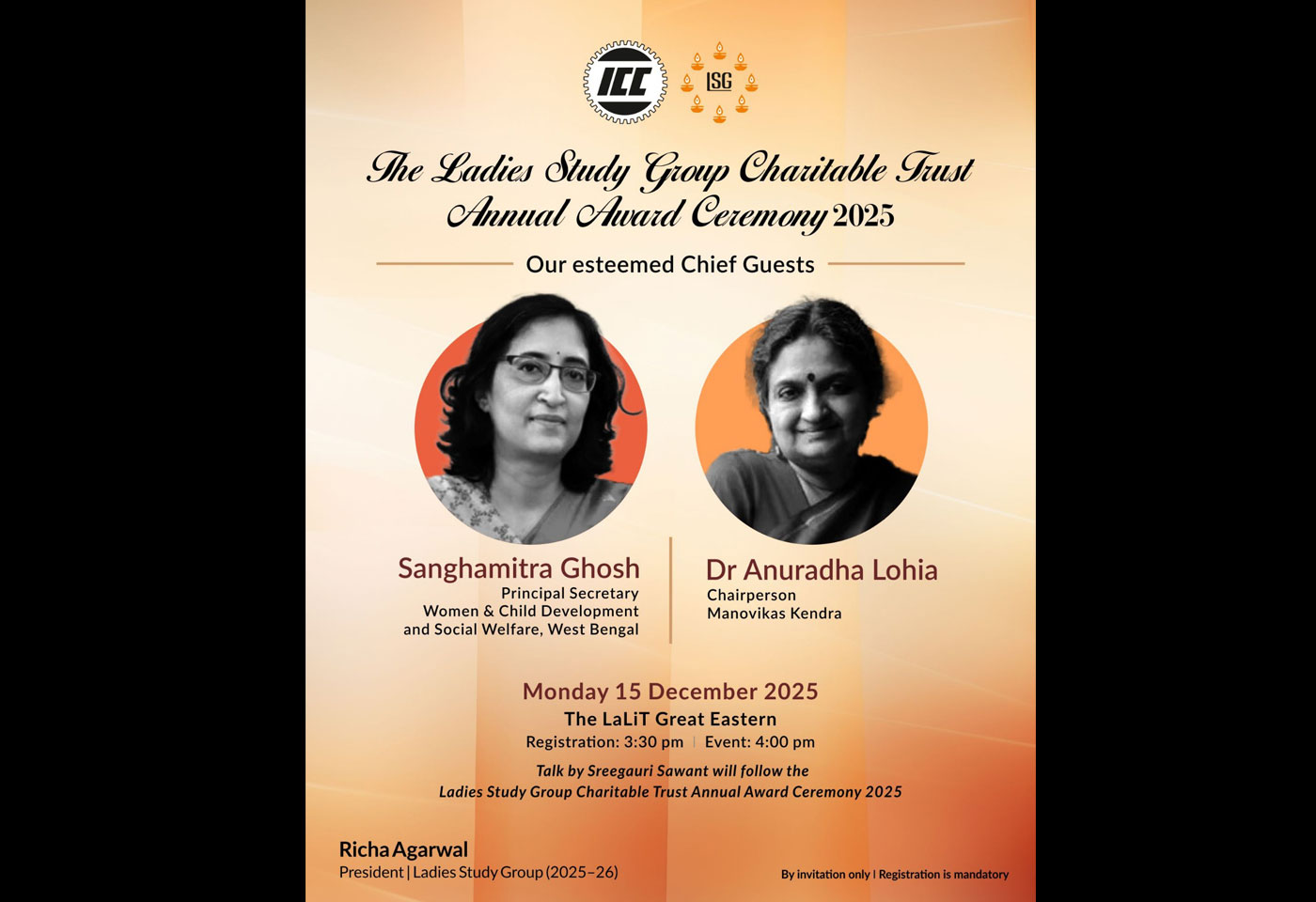
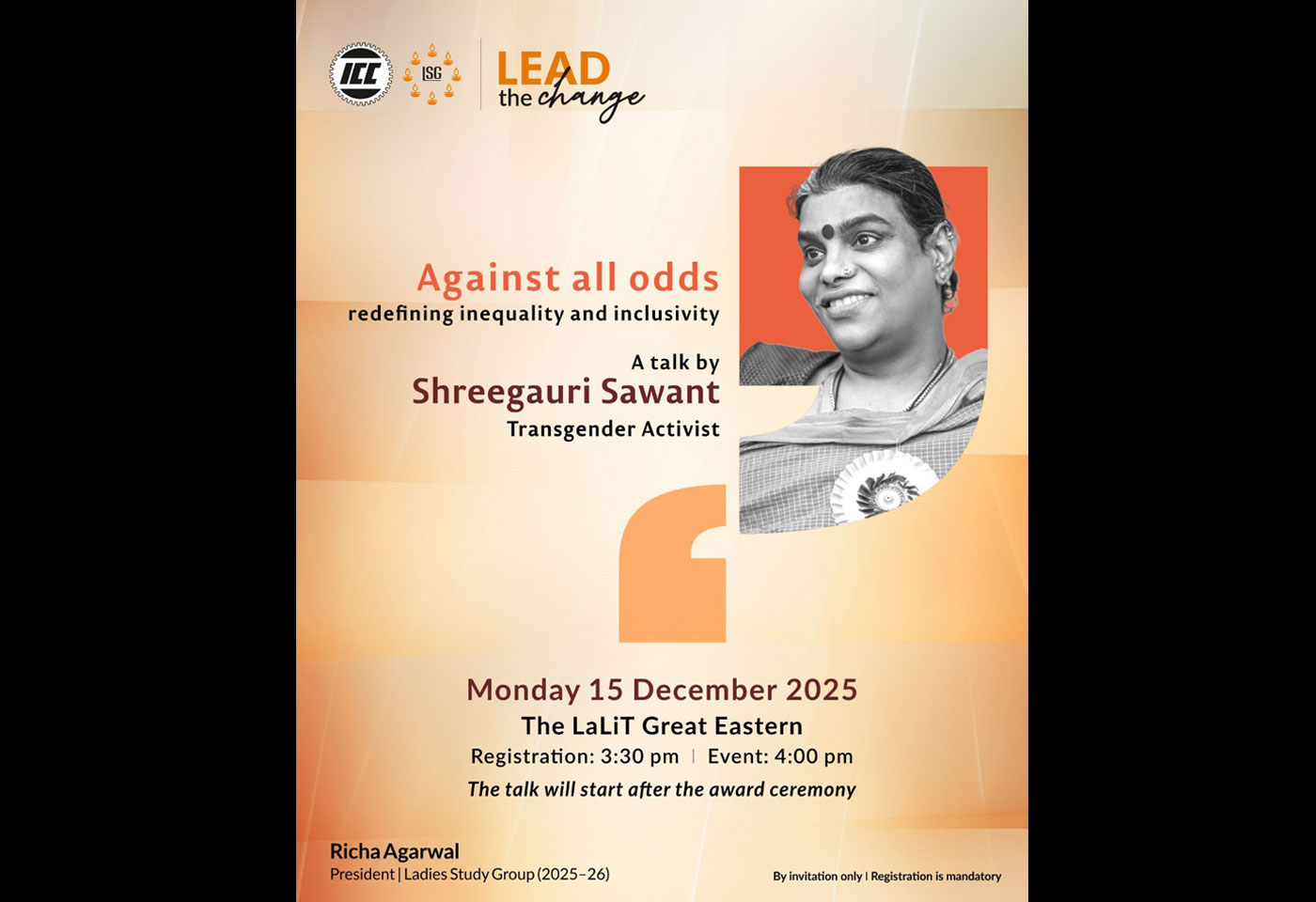








Speaker: Padma Shri Arundhati Bhattacharya
Venue: Auditorium at IMI
The Ladies Study Group (LSG), under the leadership of President Richa Agarwal, hosted yet another compelling edition of its flagship initiative Lead the Change on 14 November 2025 at the Auditorium of IMI. The afternoon brought together members, guests, and thought leaders for an insightful conversation with Padma Shri Arundhati Bhattacharya, President & CEO, Salesforce South Asia, and the first woman Chairperson in the 200-year history of the State Bank of India (SBI). She was in conversation with Vivek Bajaj, noted entrepreneur and educator whose knowledge platforms have shaped financial learning for millions.
Opening Address
Richa Agarwal set the tone with a warm and thoughtful welcome, describing the audience as “a room full of curious minds, constantly looking to learn and grow.” In her address, she highlighted Mrs. Bhattacharya’s extraordinary journey across banking and technology — a journey defined by courage, reinvention, and the ability to stay relevant through changing times. She noted how Mrs. Bhattacharya has been at the centre of some of India’s most critical financial transitions—from digitisation to demonetisation—demonstrating leadership rooted equally in adaptability and grace.
Conversation Highlights
The conversation between Vivek Bajaj and Arundhati Bhattacharya unfolded as a rich tapestry of personal insight, lived experience, and pragmatic wisdom.
A recurring theme was change — not as an external force alone, but as something that must be embraced internally.
Mrs. Bhattacharya emphasised that change comes from within and that questioning, introspection, and willingness to evolve are central to creating impact. While the banking sector has often been weighed down by crisis, cleanup, and regulatory pressures, she reminded the audience that “on the other side, creation also happens”—notably the digitisation of banking, which reshaped customer experience and opened new possibilities.
She spoke candidly about the many new perspectives that emerged during SBI’s transformation. “One story ending and another beginning is what the market sees and rewards,” she observed, reflecting on the delicate interplay of transitions and opportunities.
On Policy, Governance, and Responsibility
When asked whether the government frequently consults SBI on policy, she responded with honesty and humour. She recalled how the crew on Delhi flights recognised her due to her frequent visits for consultations, affirming that the government not only seeks the bank’s input but also offers ample space for suggestions. “That’s how a country changes,” she remarked — through dialogue, collaboration, and informed decision-making.
One of the most memorable moments came when she spoke about what truly impresses her in people. She shared an anecdote from her years of receiving countless letters at the bank. Some employees would return them stamped “Not for Me,” which, she said, would upset her. “The customer has written to the bank. If you don’t know whose problem it is, find out and solve it.”
For her, taking responsibility is the hallmark of character — not shirking it.
On Technology and the Future
Speaking about AI, she urged the audience not to fear it. “Don’t be scared of AI; lean into it,” she advised. Use it wisely, harness its benefits, understand its limitations — but don’t resist progress.
Managing Life: A Philosophy of Balance
Mrs. Bhattacharya offered profound life lessons rooted in balance — trusting oneself yet seeking help when needed, being grateful for support received, and extending the same support to others. She noted that this balance is essential for navigating both home and career.
She also illustrated resilience through stories — from the software engineer who shifted paths to open a palliative care centre launching this December, to a former banker who now runs a thriving online business selling hand-crafted crochet products. “If someone says they don’t have opportunities,” she said sharply, “it is their lack of imagination, not the absence of opportunity.”
On a Changing World
Reflecting on global shifts, she spoke of evolving feminist narratives, thawing geopolitical relationships, and transformations across healthcare, life sciences, politics, and gender. Adaptation, risk-taking, and creative reinvention, she said, are essential as the world continues to change at unprecedented speed.
Vote of Thanks
The session concluded with a Vote of Thanks delivered by Enu Bala, who summarised the afternoon’s spirit — one of inspiration, introspection, and renewed determination to lead change with purpose.
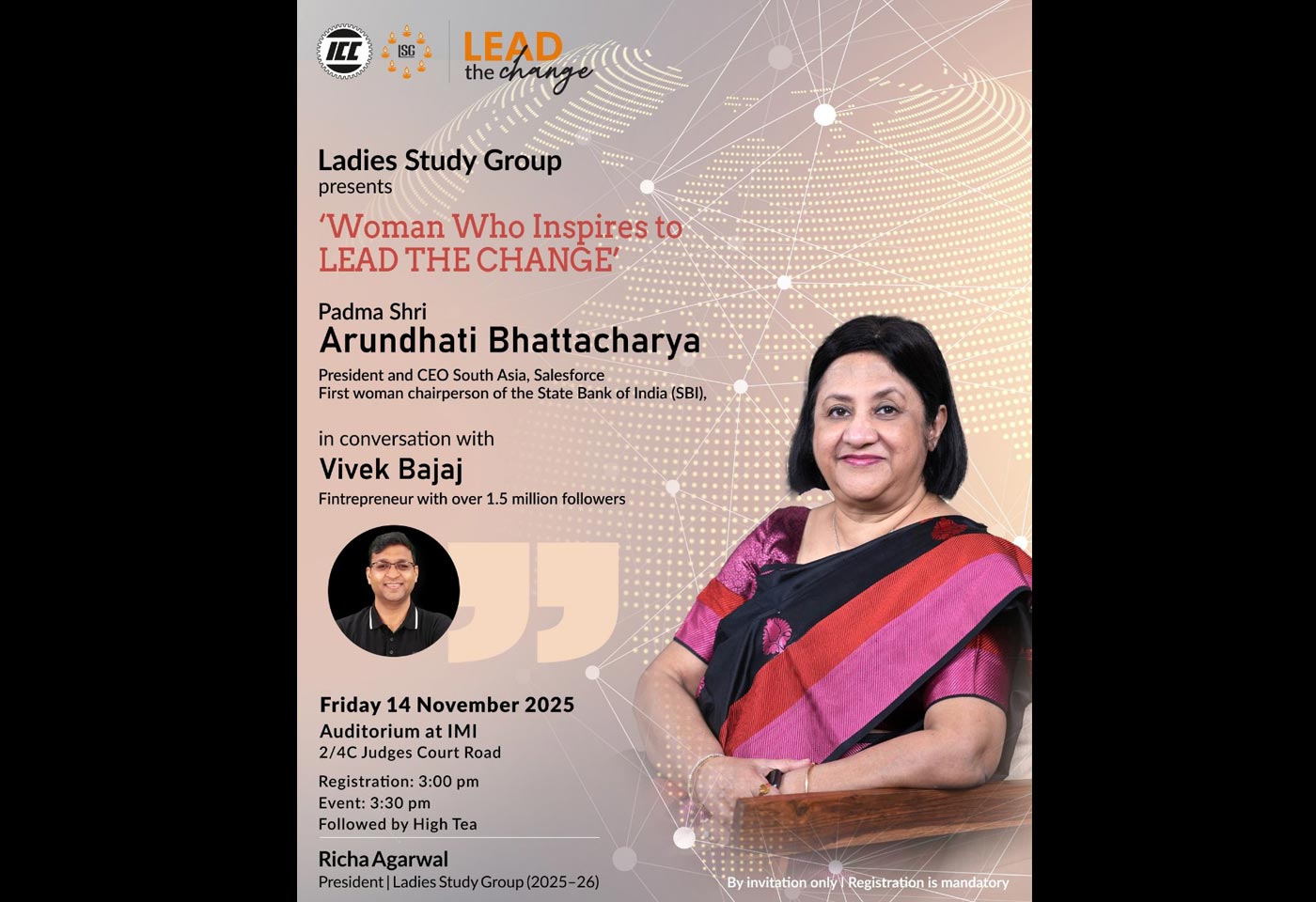
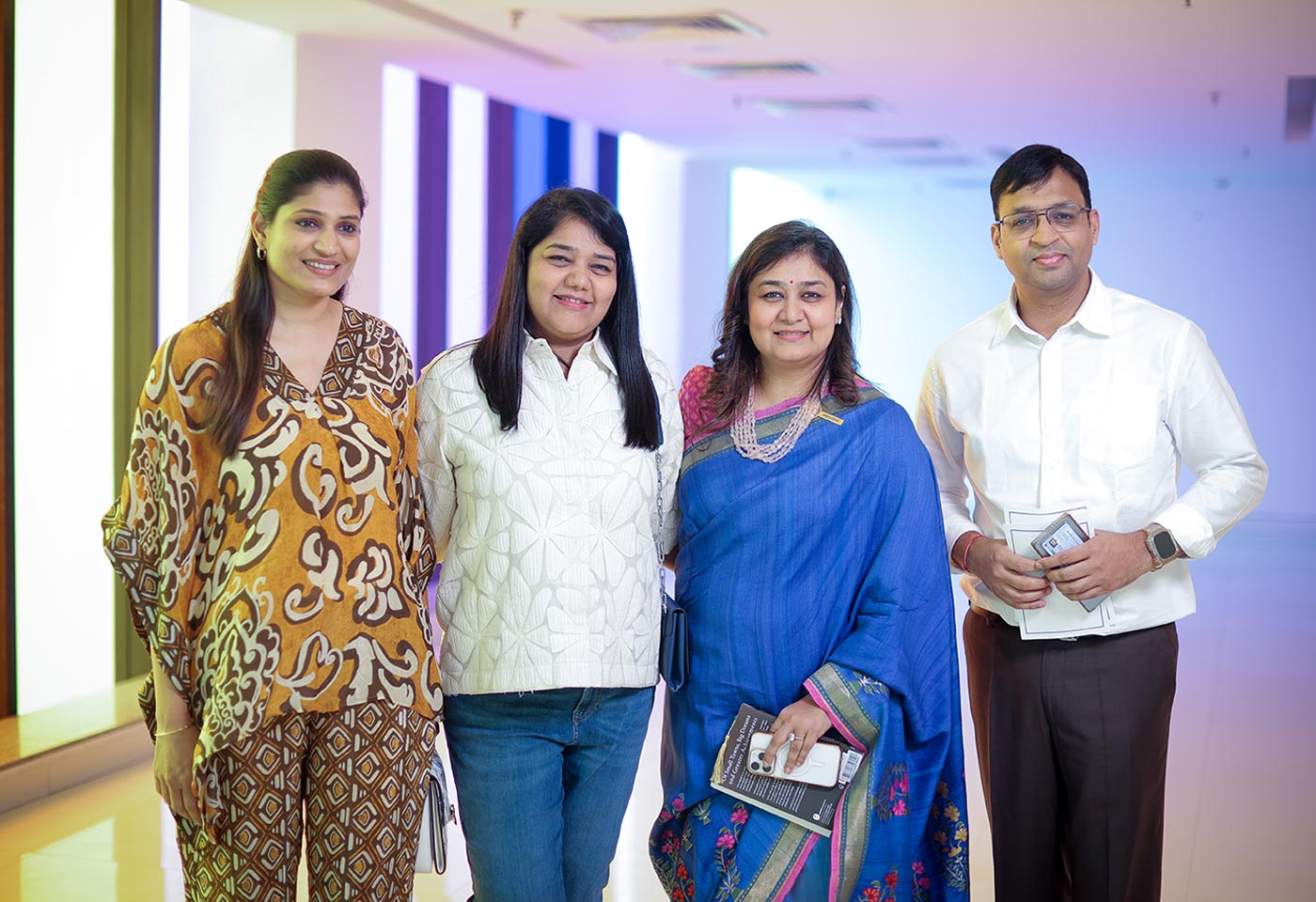
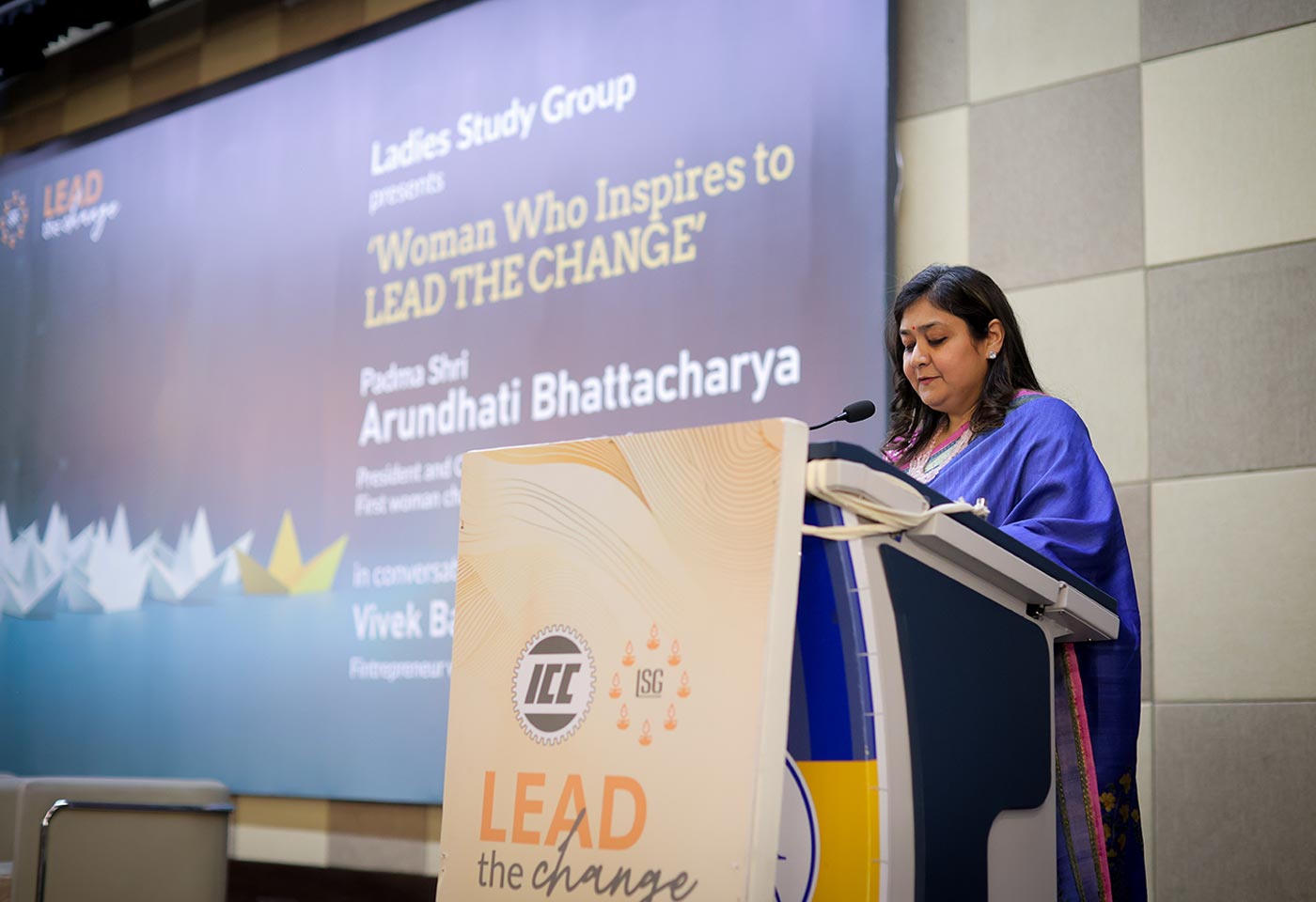





Speaker: Palki Sharma Upadhyay
Venue: Hyatt Centric
The Ladies Study Group (LSG) hosted a deeply engaging and insightful session with celebrated journalist and media personality Palki Sharma Upadhyay, in conversation with Arpit Agarwal, Founder and Managing Director of Imprimis Media on 6th November 2025 at The Hyatt Centric. The event, held under the leadership of Richa Agarwal, President of LSG, offered an afternoon of reflection, intelligence, and calm conviction — exploring questions of identity, leadership, truth, and the evolving nature of media and womanhood.
The session began with a short and heartwarming video celebrating the six-month journey of LSG, which filled the room with nostalgia and pride. It was followed by Richa Agarwal’s opening address, a thoughtful and eloquent introduction that set the tone for the afternoon. She spoke about disruptors — people who challenge the accepted and redefine the norm — and introduced Palki Sharma as “a truth-teller in an age of noise,” a voice that commands attention through clarity rather than volume.
Richa Agarwal shared how she had first met Palki at CNN TV18’s She Shakti event in Delhi earlier this year, where their conversation on balancing ambition and purpose left a lasting impression. She reflected on Palki’s rare ability to combine depth with decisiveness and welcomed her as an inspiring force for women everywhere. She also introduced Arpit Agarwal, highlighting his three decades of experience in communications across India, Singapore, and Israel, and his sharp storytelling instincts as the author of R&AW Material.
A Dialogue of Depth and Clarity
The conversation that followed between Palki Sharma and Arpit Agarwal unfolded as an honest, intelligent, and at times deeply personal dialogue. Palki spoke about her life, identity, and self-awareness, sharing how she often ends her day in conversation with herself — reflecting on her choices, moments of difficulty, and areas for growth.
When asked about leadership and authority, she reflected on mentors who were strict yet just — individuals who guided her through firmness balanced with empathy. Drawing from her own experiences, she highlighted the transformative power of simple, caring gestures — how even concern for something as ordinary as one’s eating schedule can create lasting impact.
She also shared memories of her early years in Delhi, describing them as some of her most comforting and formative times, shaping her approach to work and relationships alike.
On Gen Z, Media, and the Question of Truth
When Arpit steered the conversation toward the Gen Z work ethic, Palki offered a nuanced and balanced perspective. She praised the generation for its spirit, curiosity, and courage to question. “They have the fire,” she remarked, “but it needs to be ignited by purpose — they must see meaning in the work they do.” She appreciated their willingness to challenge and be challenged, seeing this as a sign of evolving professional consciousness.
In discussing her television media experience, Palki delved into the challenges of balancing credibility with the pace of modern news. Responding to Arpit’s question about the accusation that “television chases speed over substance,” she reflected on the media’s dilemma between being first and being right. She emphasised how her own work seeks to uphold credibility, depth, and authentic storytelling despite the prevailing pressure for sensationalism.
Her critique of TRPs as an unreliable marker of quality was both sharp and thoughtful. She noted that the real issue lies not in the metric itself, but in viewers’ growing readiness to accept sensationalism over substance.
Palki also touched upon the global landscape of misinformation, offering examples from contemporary political events where headlines have amplified inaccuracies. She spoke about the moral and ethical boundaries journalists must draw, stating with characteristic wit that “one should never write a story they wouldn’t want to watch.”
Women, Power, and Authenticity
Palki’s reflections became particularly personal when she spoke about her mother and her child, acknowledging how these relationships keep her grounded and centred. She credited her mother as her greatest source of inspiration — a reminder of the strength that comes from rootedness and empathy.
In one of the most resonant moments of the afternoon, she spoke about the importance of women supporting women, and the urgent need for more women in leadership positions who understand the practical challenges women face in balancing professional and personal expectations. She underscored that true empowerment comes not from imitation, but from mutual understanding and solidarity.
Palki concluded with reflections on authenticity, accuracy, and personal ethics, exploring how professionals must decide whether to endorse or step away from stories that conflict with their values.
Closing Moments
The session drew to a close with a warm Vote of Thanks by Enu Bala, who acknowledged the depth, candour, and grace that defined the afternoon. Members of the audience resonated with Palki’s thoughtful approach, her ability to weave together global insight and personal truth, and her calm yet commanding presence that spoke directly to the essence of leadership and womanhood.
The event stood as a reminder of why LSG continues to remain a vital space for dialogue, reflection, and inspiration, where voices like Palki Sharma’s not only inform but also transform perspectives.









Speaker: Kavyal Seddani
Venue: Hyatt Centric
The Ladies Study Group hosted an inspiring and thought-provoking session titled Design Your Destiny: Manifesting Abundance and Success with internationally acclaimed Life Coach, Hypnotherapist, and Relationship Expert Kavyal Seddani. The event was graced by an enthusiastic gathering of members eager to explore the art of creating abundance, purpose, and self-belief.
In her opening remarks, Richa Agarwal, President of Ladies Study Group, welcomed the audience and introduced Kavyal Seddani as one of the torchbearers in the field of emotional and spiritual wellbeing. She highlighted Seddani’s vast experience of over 17 years, her international recognition, and her unique blend of therapeutic and spiritual practices that have transformed countless lives. Emphasising the theme of self-awareness and inner energy, Richa Agarwal invited everyone to embark on a journey of self-discovery and manifestation.
Kavyal Seddani began her talk by reflecting on her own journey - from a troubled teenager with humble beginnings to a globally recognised voice in life coaching. She shared candid anecdotes about her early struggles, including living for a year in a store room, which, she said, taught her the real value of money and resilience.
Drawing from her life experiences, Seddani spoke about the power of being a “jack of all trades”. She celebrated multitasking and multi-managing as powerful tools for achieving one’s dreams, especially for women who naturally juggle multiple roles. “If you are a jack of all, you’re already closer to your dream than if you were a master of one,” she asserted, encouraging women to take pride in their multifaceted lives.
Touching upon societal attitudes toward therapy, Seddani discussed how she confronted the stereotype that therapy merely profits from people’s problems. She invited the audience to reframe such perceptions and embrace mental health conversations with openness.
A recurring theme in her talk was the idea of ordinariness as a route to extraordinariness. “To be as ordinary as possible is to be extraordinary,” she said, reminding everyone that greatness often grows quietly from simplicity and perseverance.
She also spoke about the low expectations often placed on women and how that, paradoxically, could serve as a hidden advantage - a space that allows for mistakes, experimentation, and learning. “Overachievers aren’t allowed to fail,” she remarked, urging women to reclaim their right to imperfection.
In a deeply reflective exercise, Seddani invited the audience to write down their vision of an “extraordinary life.” She guided participants to define abundance as “the ability to do what you want, when and how you want to do it.” Using a vivid metaphor, she compared life to a car, cautioning against spending all one’s time collecting fuel (resources) without ever going for the drive (living fully).
She challenged everyone to question what they truly seek — money or freedom — and to manifest their desires with clarity and intention. “If something comes to you and you believe you don’t deserve it, it will not stay,” she reminded the group.
Seddani captivated the audience with a story about her long-cherished wish to meet Oprah Winfrey, illustrating the power of specific manifestation. Her persistence and faith eventually led her to attend Oprah’s show — a testament, she said, to how the universe listens when one asks with clarity and belief.
The session delved into identifying and unlearning internalised belief systems that often hold women back — from being accommodating in social settings to undervaluing themselves in personal and professional spaces. “Don’t measure your worth by how your insiders perceive you,” she said. “Measure it by how the world values you.”
She also introduced the concept of low and high vibrations, encouraging participants to stay in higher emotional frequencies through self-belief and purposeful engagement, rather than sinking into self-doubt or negativity.
The session concluded with a guided meditative and hypnotic visualisation, where participants were encouraged to envision living their dreams in the present moment. The powerful exercise was accompanied by the song “Aashayein” from the film Iqbal, creating a deeply emotional and transformative atmosphere.
The afternoon ended with a heartfelt Vote of Thanks by Enu Bala, followed by a warm and engaging high tea where members continued to reflect on the day’s insights.
Design Your Destiny was more than a motivational session - it was an immersive journey of introspection, energy alignment, and empowerment. Kavyal Seddani’s blend of candour, humour, and spiritual depth left the audience inspired to redefine success on their own terms and to manifest a life that truly reflects their dreams and inner worth.








Speaker: Alokananda Roy
Venue: Emami Siddhivinayak Temple
On Tuesday, 16th September 2025, the Ladies Study Group (LSG) hosted Shakti at the Emami Siddhivinayak Temple, Kolkata — a magnificent celebration of divine strength and tradition. The evening featured a spellbinding presentation by Alokananda Roy and the Darpani Troupe, who took the audience on a choreographed journey through the five sacred days of Durga Puja. Each segment beautifully depicted the essence of the festival — blending music, dance, devotion, and rituals into an immersive experience that captured the heartbeat of Bengal’s greatest celebration.
The evening began with an inaugural address by Richa Agarwal, President of LSG (2025–26), who warmly welcomed members and guests. She reflected on her deep personal connect with the Emami Siddhivinayak Temple, and on Durga Puja as not just a festival, but a unifying force where devotion meets creativity and rituals meet festivity. She also invited members to actively participate in the Dhunuchi Naach and Sindoor Khela after the performance, accompanied by the vibrant rhythms of the Dhaak.
The temple itself was transformed into a breathtaking setting for the evening. Decorated in festive red and white, with intricate alpana designs, floral arrangements, and thematic lighting, the ambience radiated the sanctity and grandeur of Pujo. The audience, dressed in traditional attire, added to the visual spectacle, making the event a living tableau of Durga Puja’s spirit.
The programme concluded with a gracious vote of thanks by Enu Bala, who appreciated the infectious energy of the troupe and the enthusiastic participation of members. The celebration ended with high tea, as guests carried home not just memories of a performance but the collective spirit of Shakti — strength, tradition, and community.













Speaker: Bobo and Moon Moon Sen
Venue: CIMA Gallery
The LSG session at CIMA Gallery on 5 September 2025 was a vibrant celebration of the theme Art in Life. The afternoon began with a warm address by Richa Agarwal, who welcomed the gathering with her reflections on how art is inseparable from life — giving it colour, rhythm, and depth — and acknowledged Mrs. Rakhi Sarkar for her vision in making this special session possible.
The conversation that followed between Bobo (Ayushman Mitra) and Moon Moon Sen unfolded with wit, candour, and insight. Bobo spoke about his early stirrings as an artist, his first experiments with sketching, and how figures such as Rituporno Ghosh inspired him by proving that a Bengali could leave such an indelible mark in cinema. He shared anecdotes from his family life and the shaping of his business, peppering the discussion with humour and playful exchanges with Moon Moon Sen. Bobo also shared a deeply personal journey that began with his grandfather, Goshto Kumar Mitra – the magician who first guided his hand on canvas. From signing his very first artwork as BOBO, to weaving together influences of Jamini Roy, Picasso, Frida Kahlo, and world cinema, his story is one of inheritance, experimentation, and fearless self-expression.He spoke openly about his liberal take on sexuality as a queer man, emphasising the role of art in breaking conventions and embracing identity. Bobo also shared his sketchbook with the audience, narrating the stories behind each page and recalling the moments that had compelled him to capture them. He highlighted how he was taught to view the human body in its purest, objective form — citing the example of his first encounter with Titanic, which made him reflect on art’s ability to normalise nudity without sensationalism.
The conversation showcased Bobo’s unique approach where art, fashion, mythology, and queerness intersect, making his work a living dialogue on self-expression and freedom. His exchange with Moon Moon Sen brought out warmth, humour, and cultural depth, offering the audience an engaging glimpse into the artist’s journey.
The evening concluded on a delightful note with a High Tea organised by CIMA Gallery, giving members a chance to continue conversations in a relaxed and convivial setting.


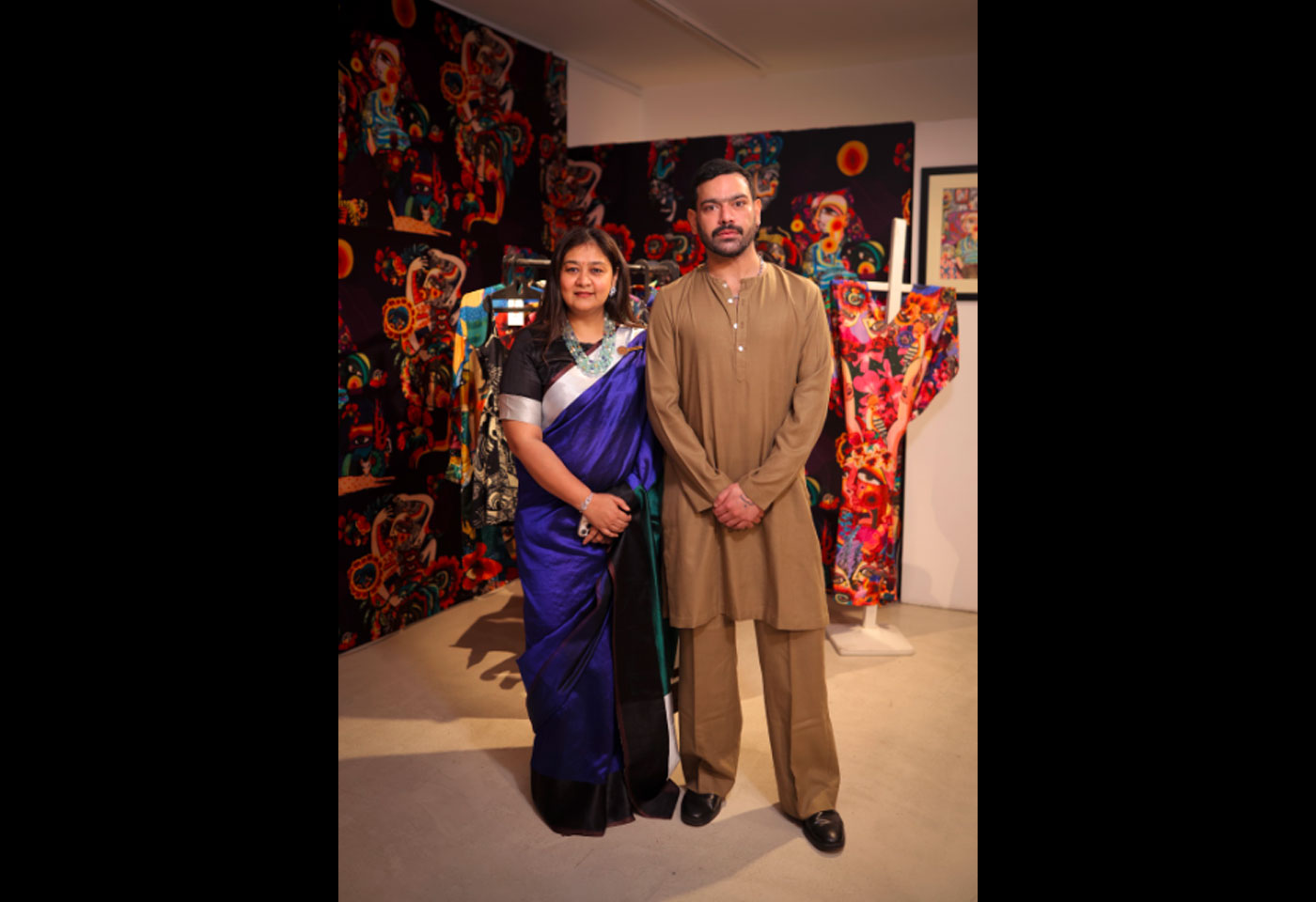
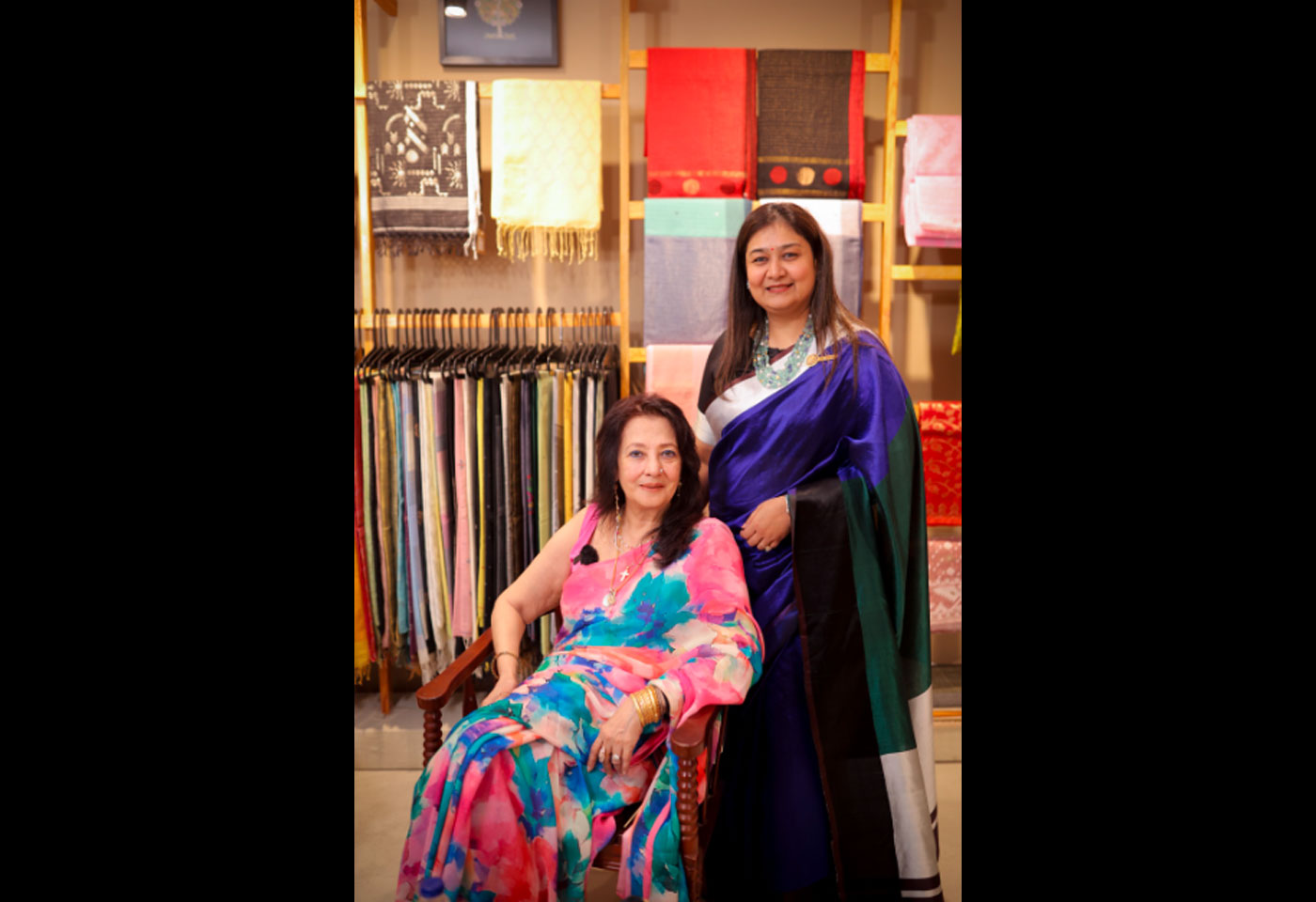
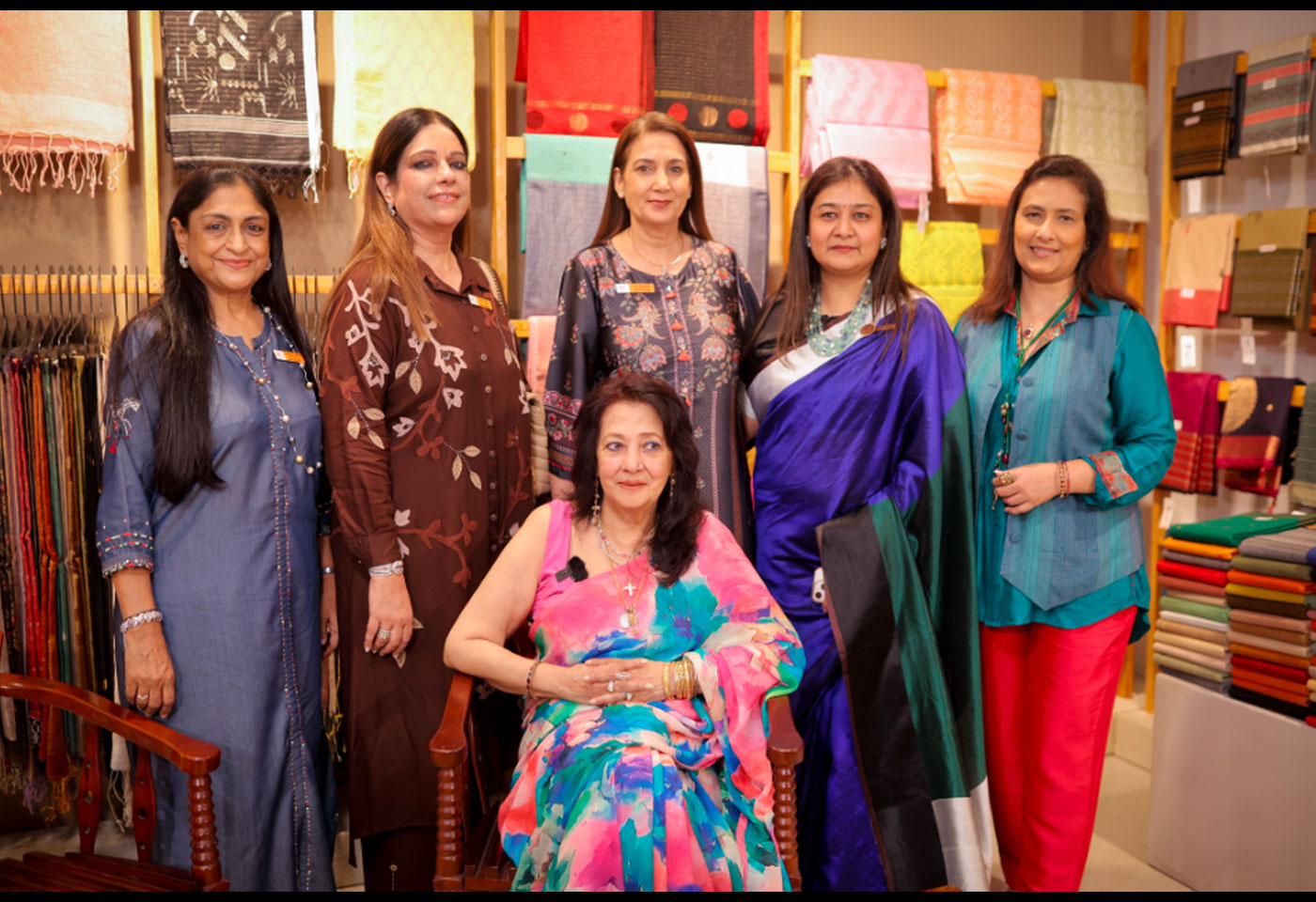
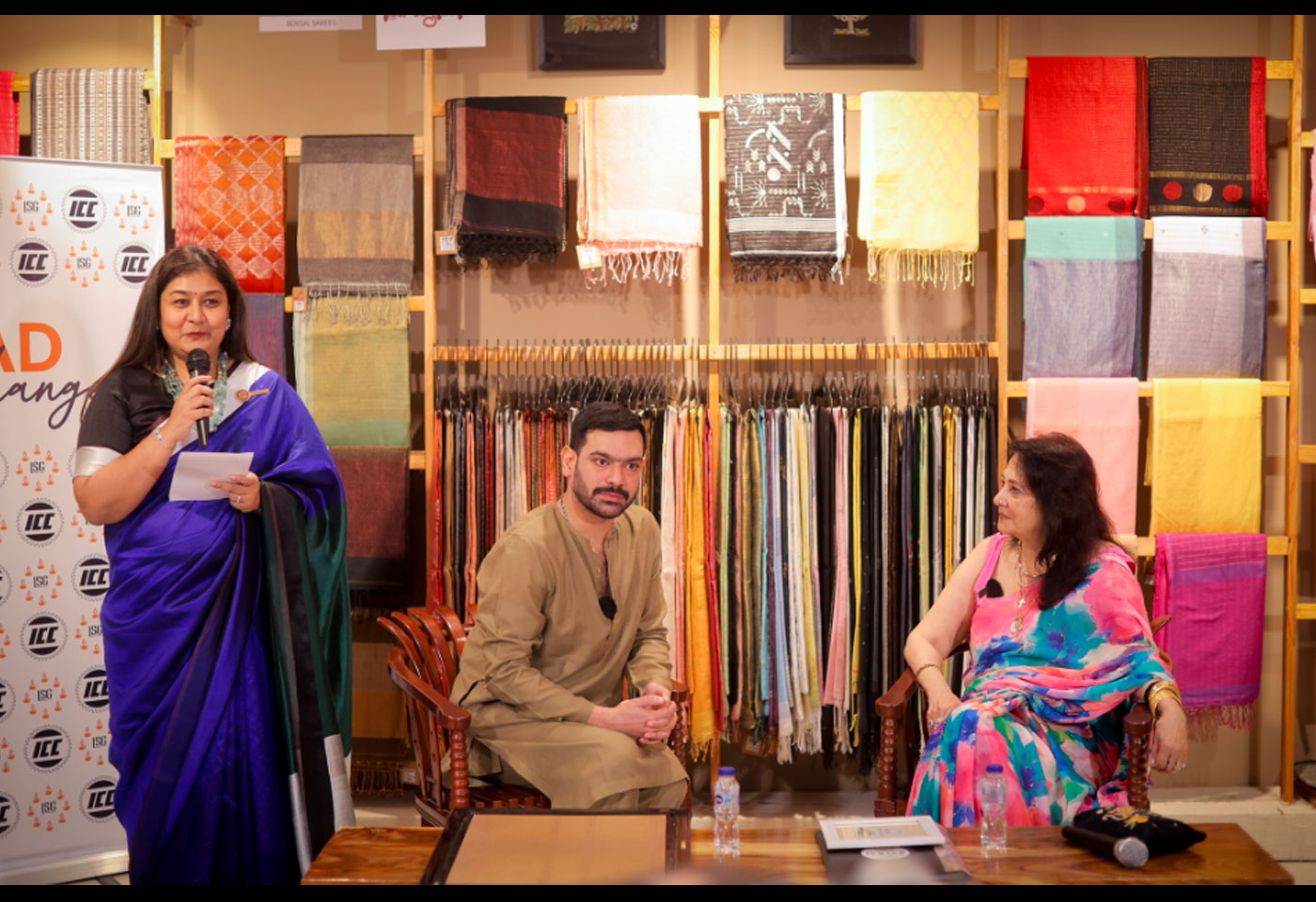


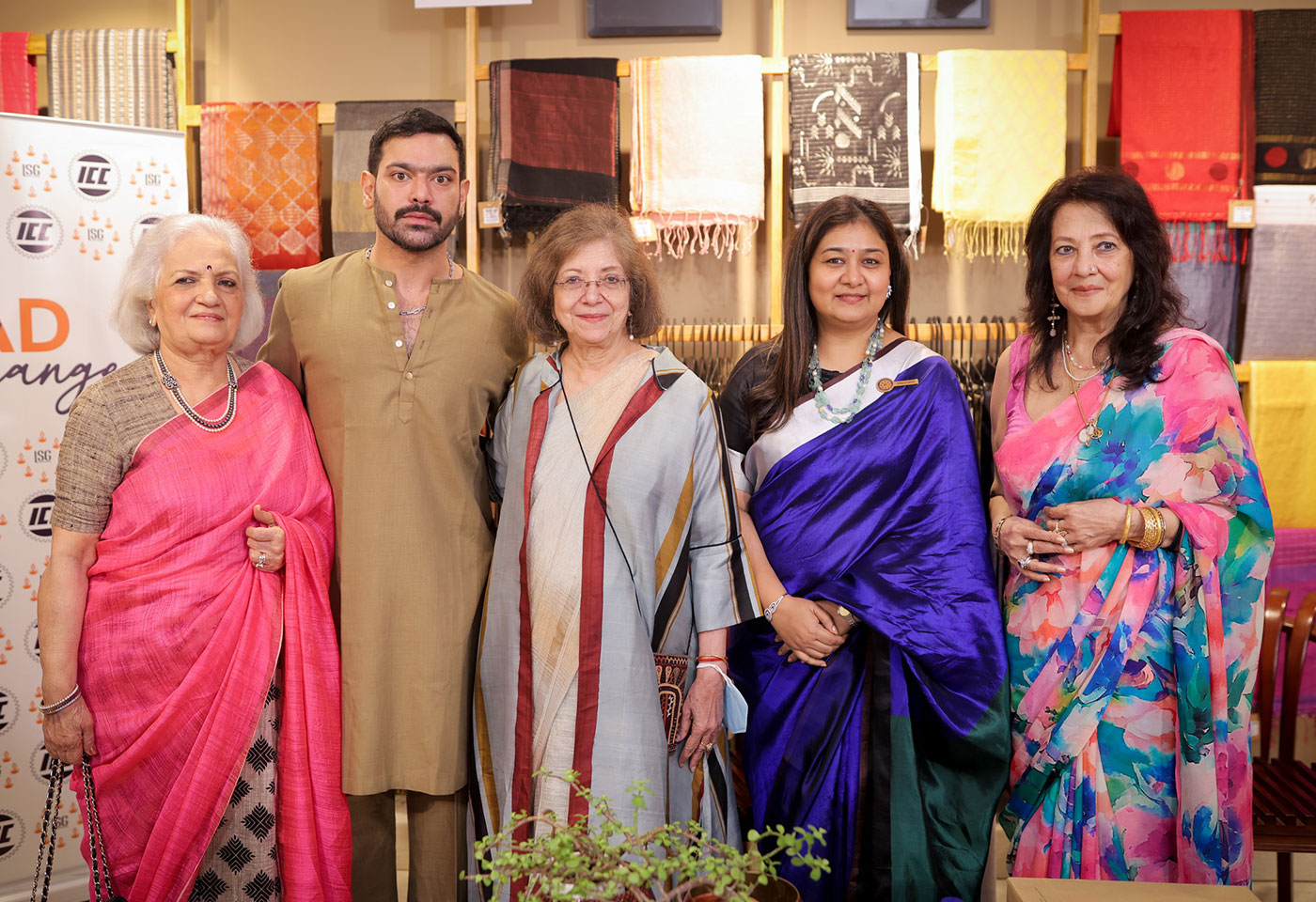
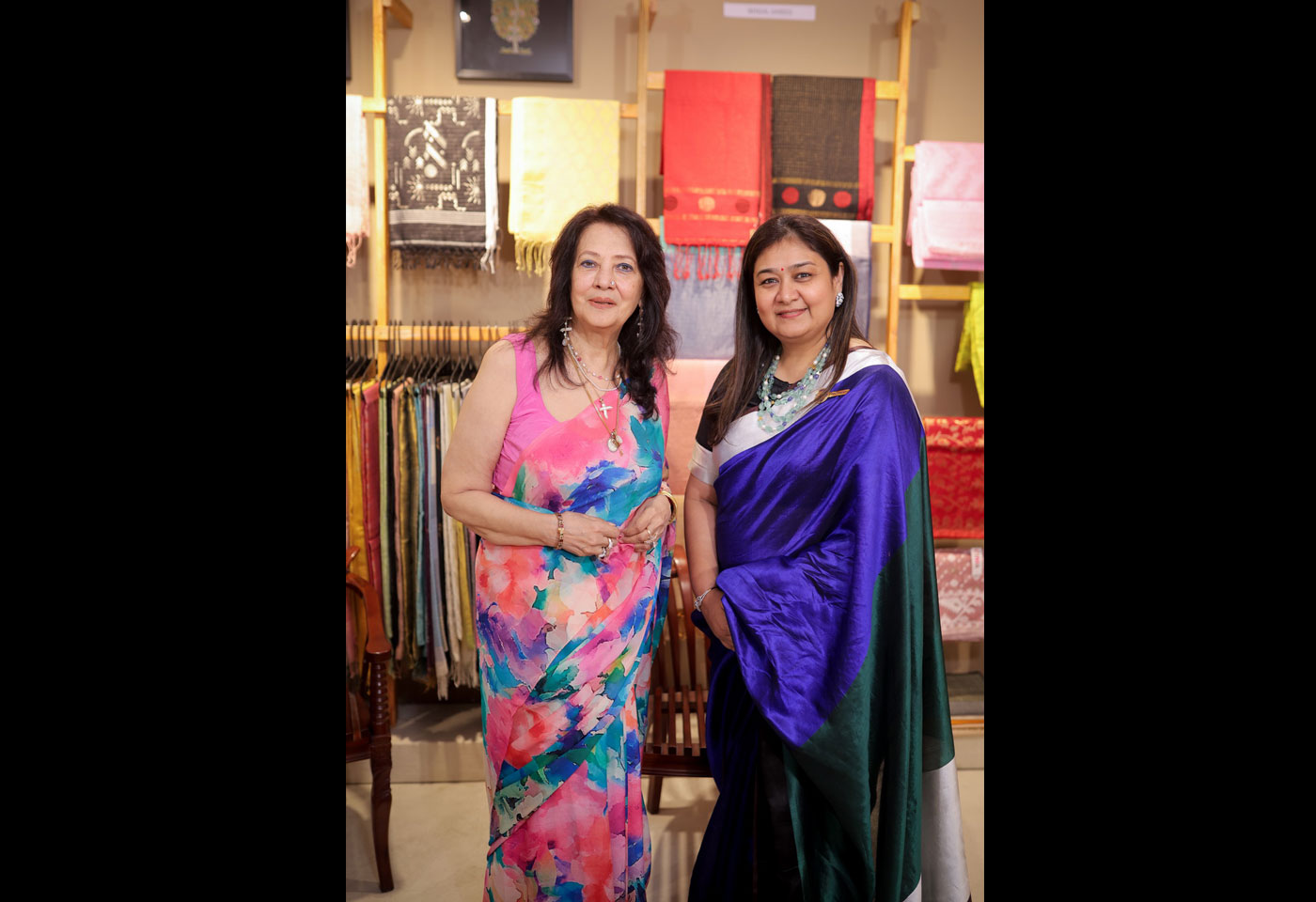

Speaker: Vishaka Saraf
Venue: EKYA, Queens Park
The Ladies Study Group, under the leadership of President Richa Agarwal (2025–26), recently hosted The Grace of Ghoomar, a three-day workshop held from 19th to 21st August 2025 at EKYA, Queens Park. The workshop was facilitated by renowned choreographer Vishaka Saraf, who guided participants through the traditional beauty, elegance, and rhythm of Rajasthan’s iconic folk dance – Ghoomar.
The sessions were marked by an atmosphere of joy, laughter, and cultural immersion, as members enthusiastically learnt and celebrated the vibrant art form. Participants dressed in colourful festive Rajasthani attire, bringing alive the spirit of Rajasthan through dance, music, and shared camaraderie.
The culmination of the workshop took place on 22nd August 2025 at Advaita, the residence of Richa Agarwal, where participants presented a graceful Ghoomar performance. In her address, Richa Agarwal warmly thanked the participants for their enthusiasm and highlighted the therapeutic joy of dancing together. She expressed special gratitude to Vishaka Saraf. for her guidance and to all the members for embracing the experience wholeheartedly. The showcase was followed by a celebratory lunch, attended by members, families, and friends, making the afternoon truly festive and memorable.
The event concluded with a heartfelt Vote of Thanks delivered by Enu Bala, who acknowledged the collective efforts that made this celebration of culture and community a resounding success.
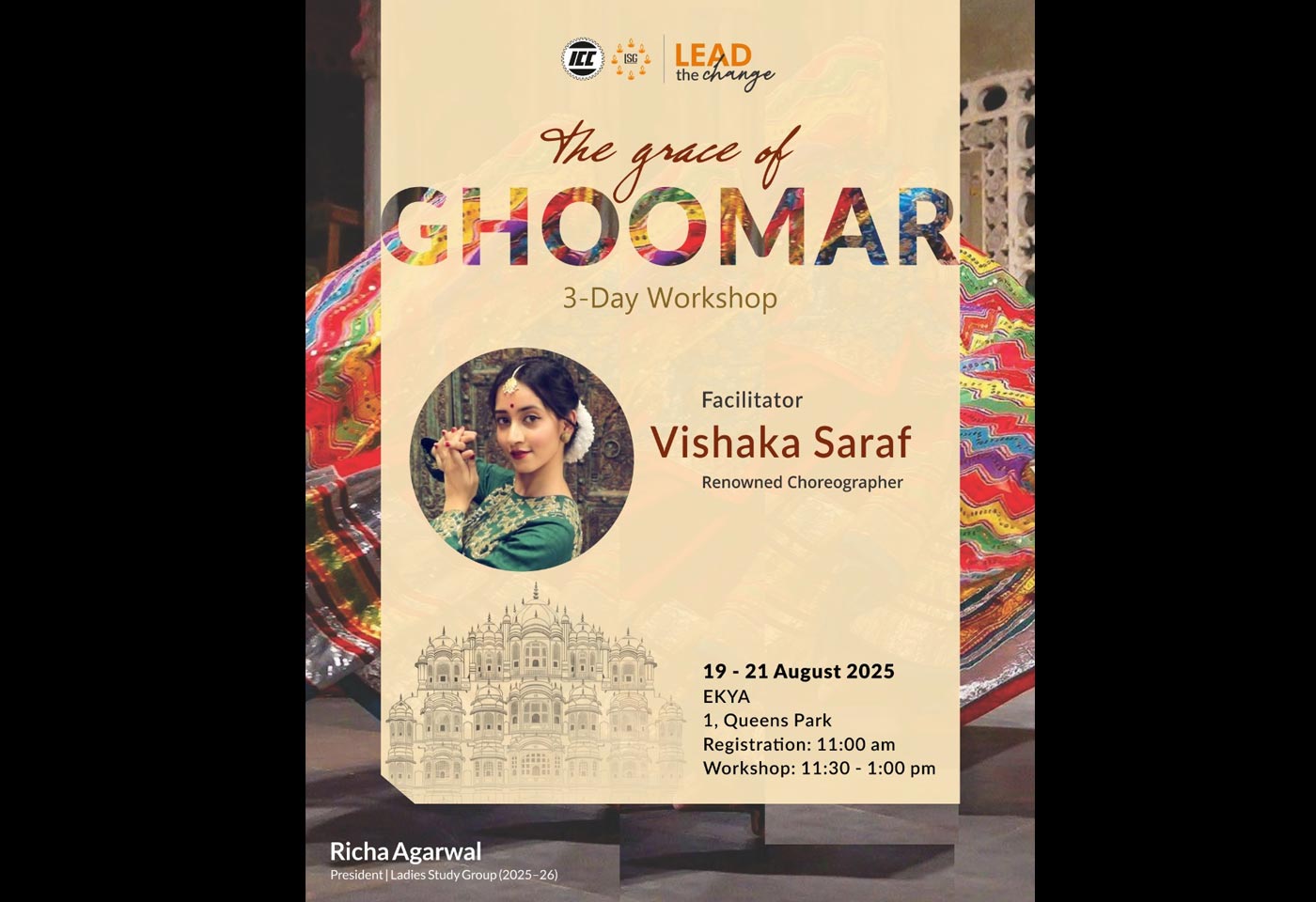
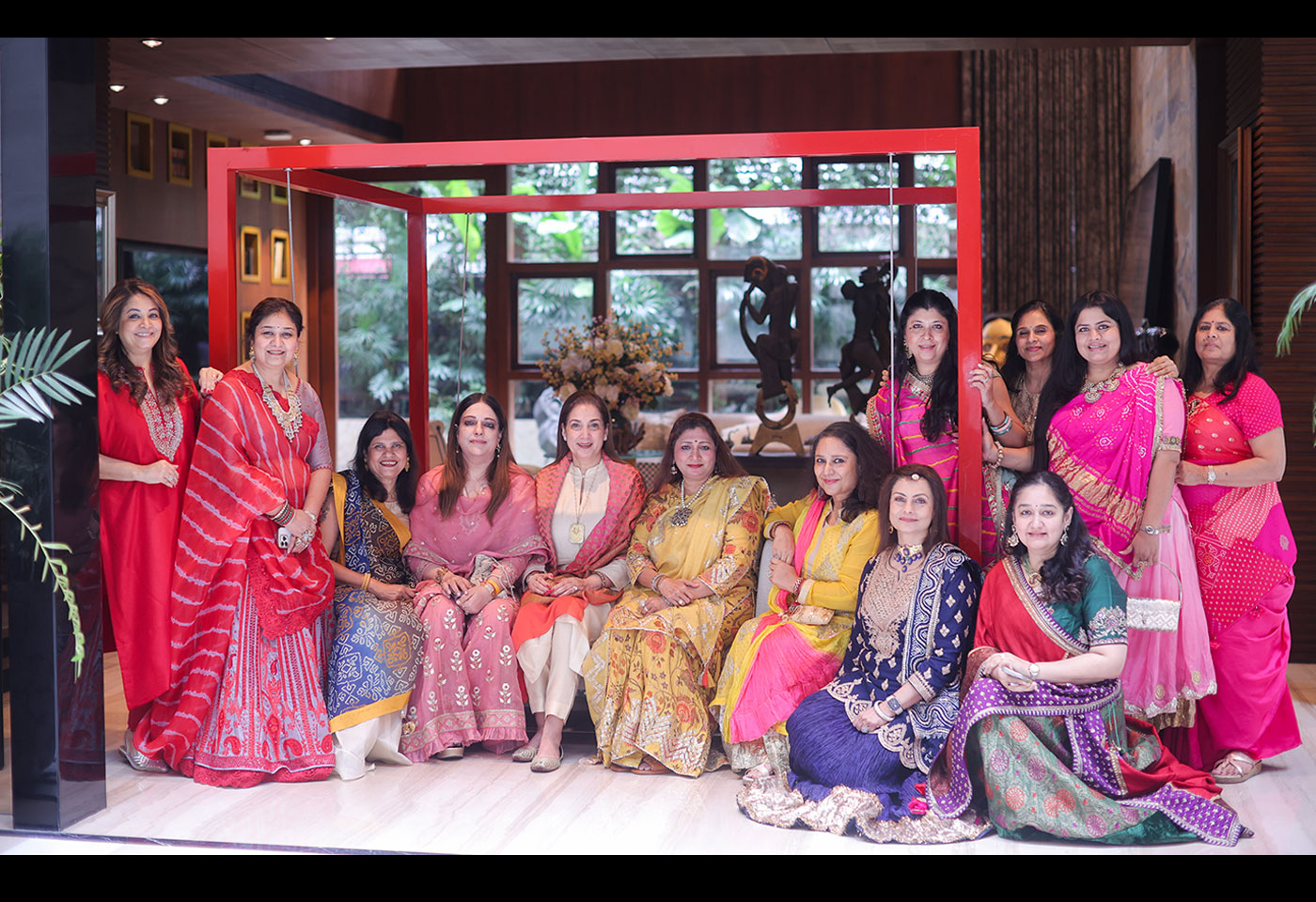
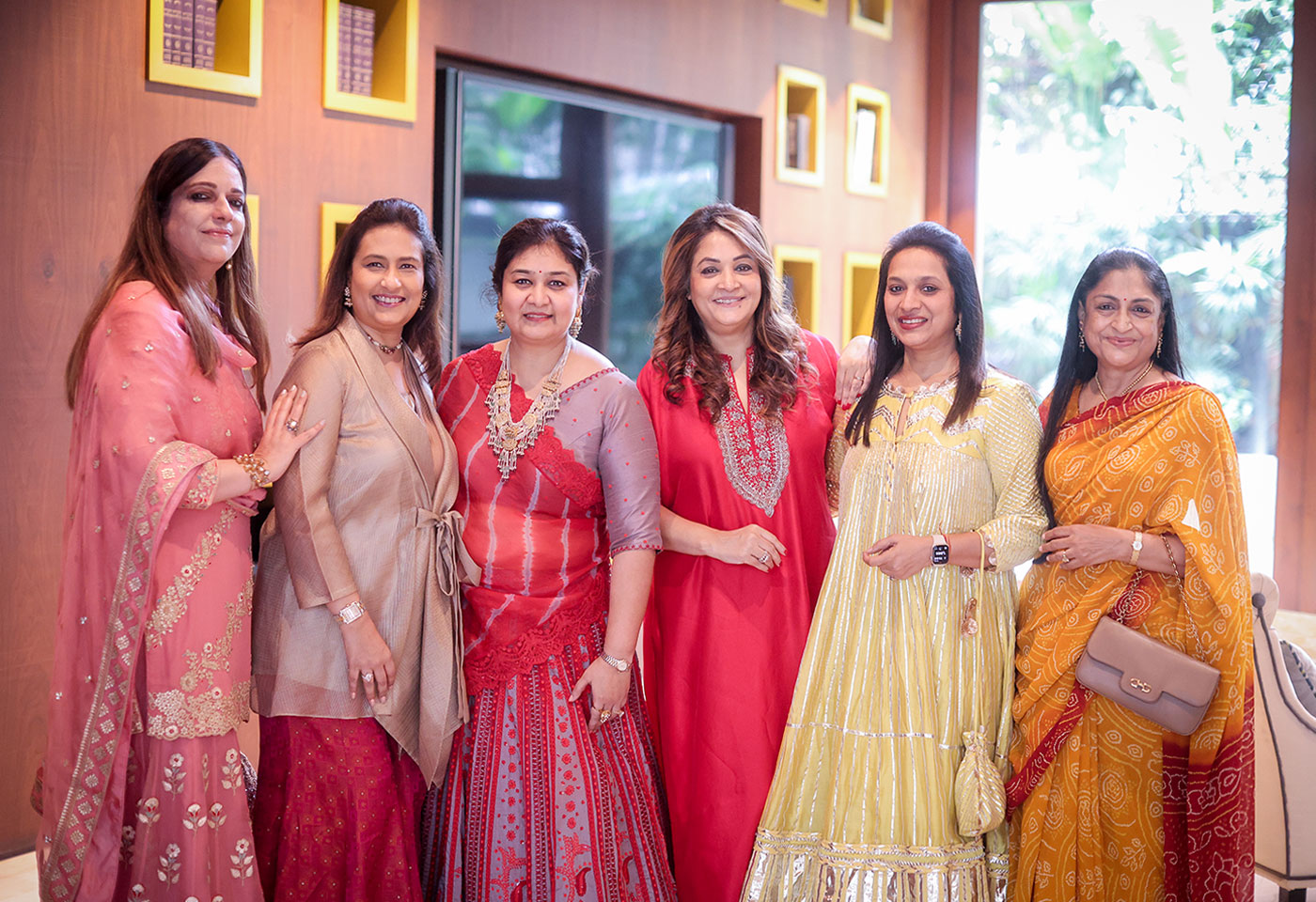
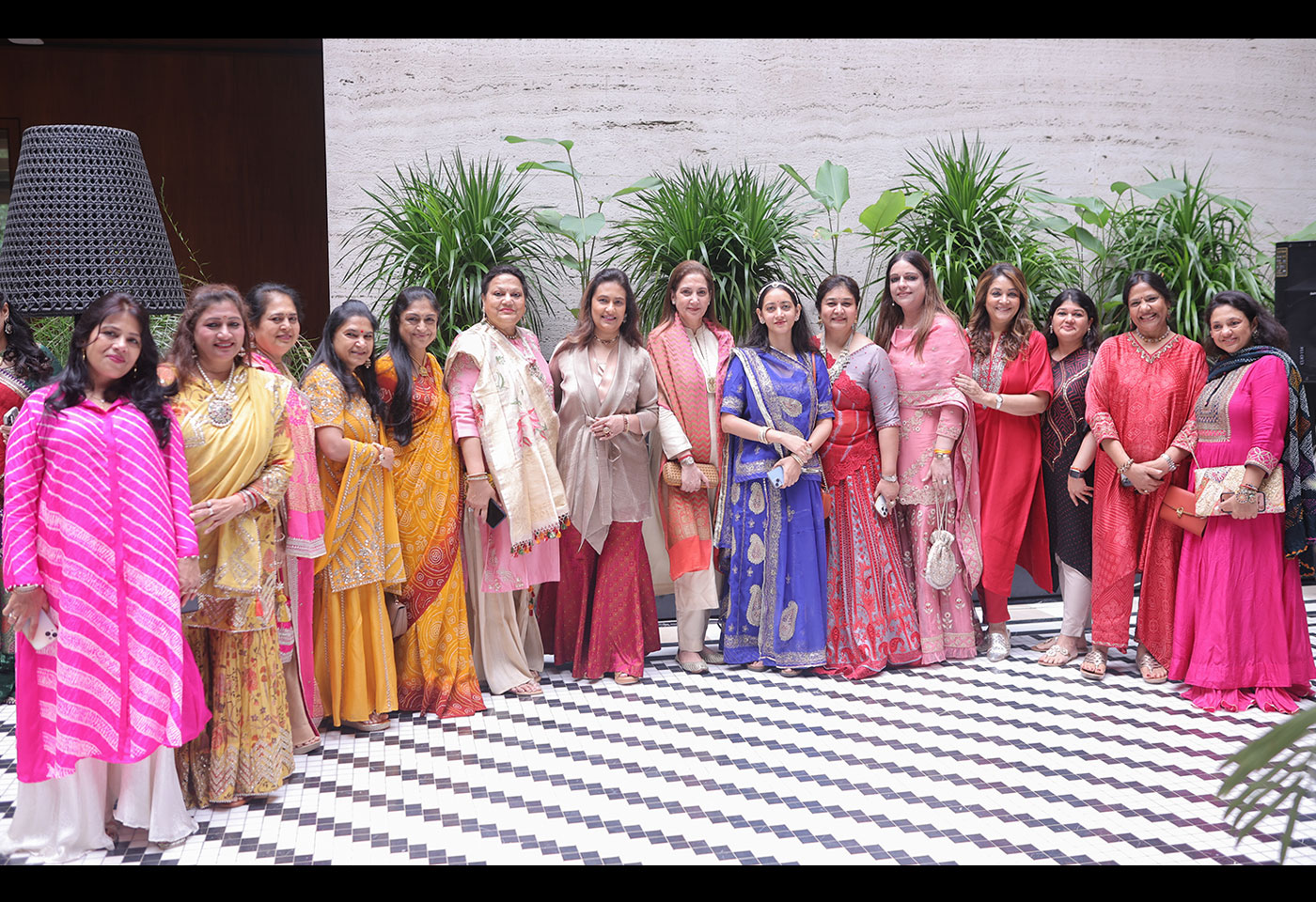
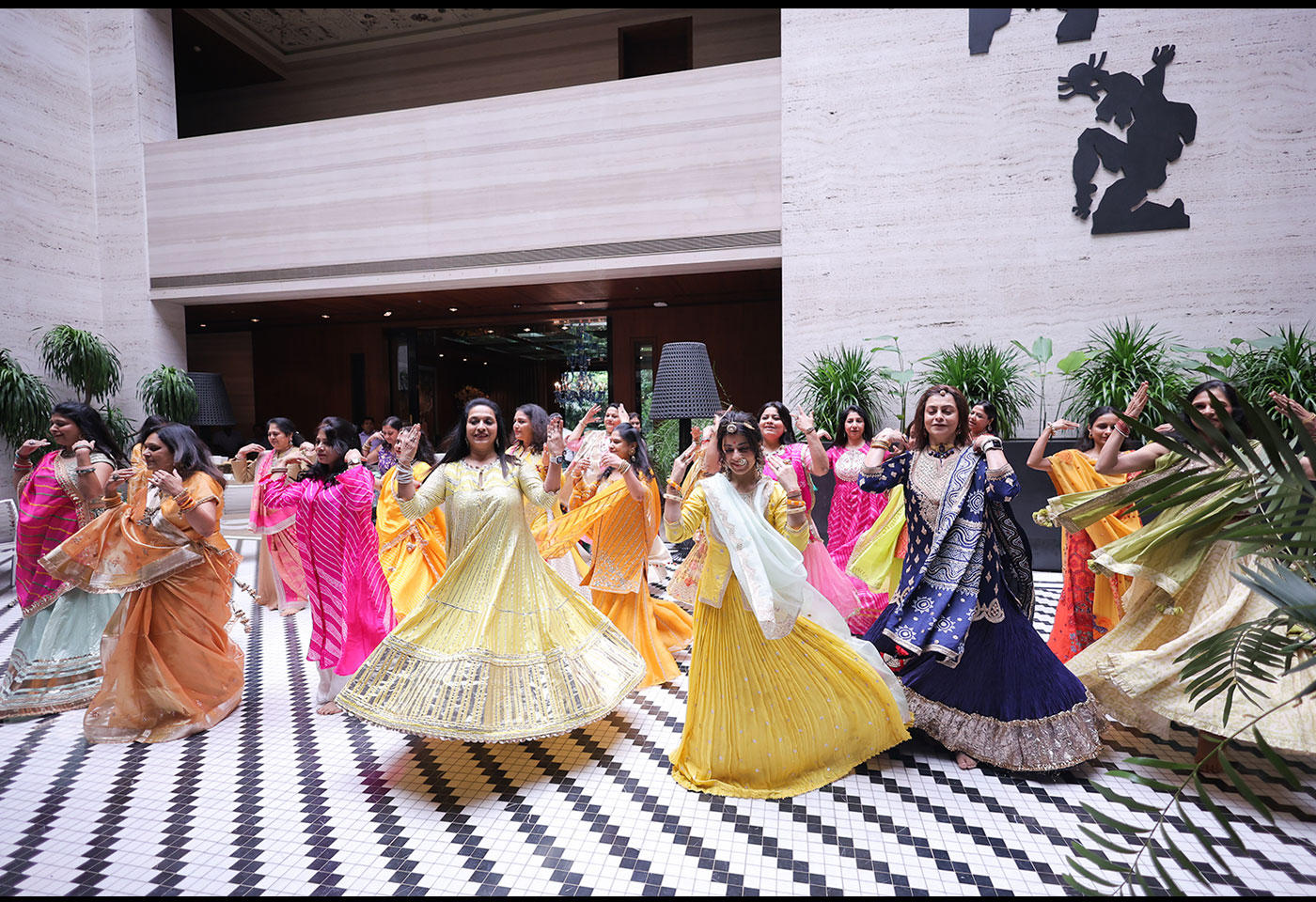

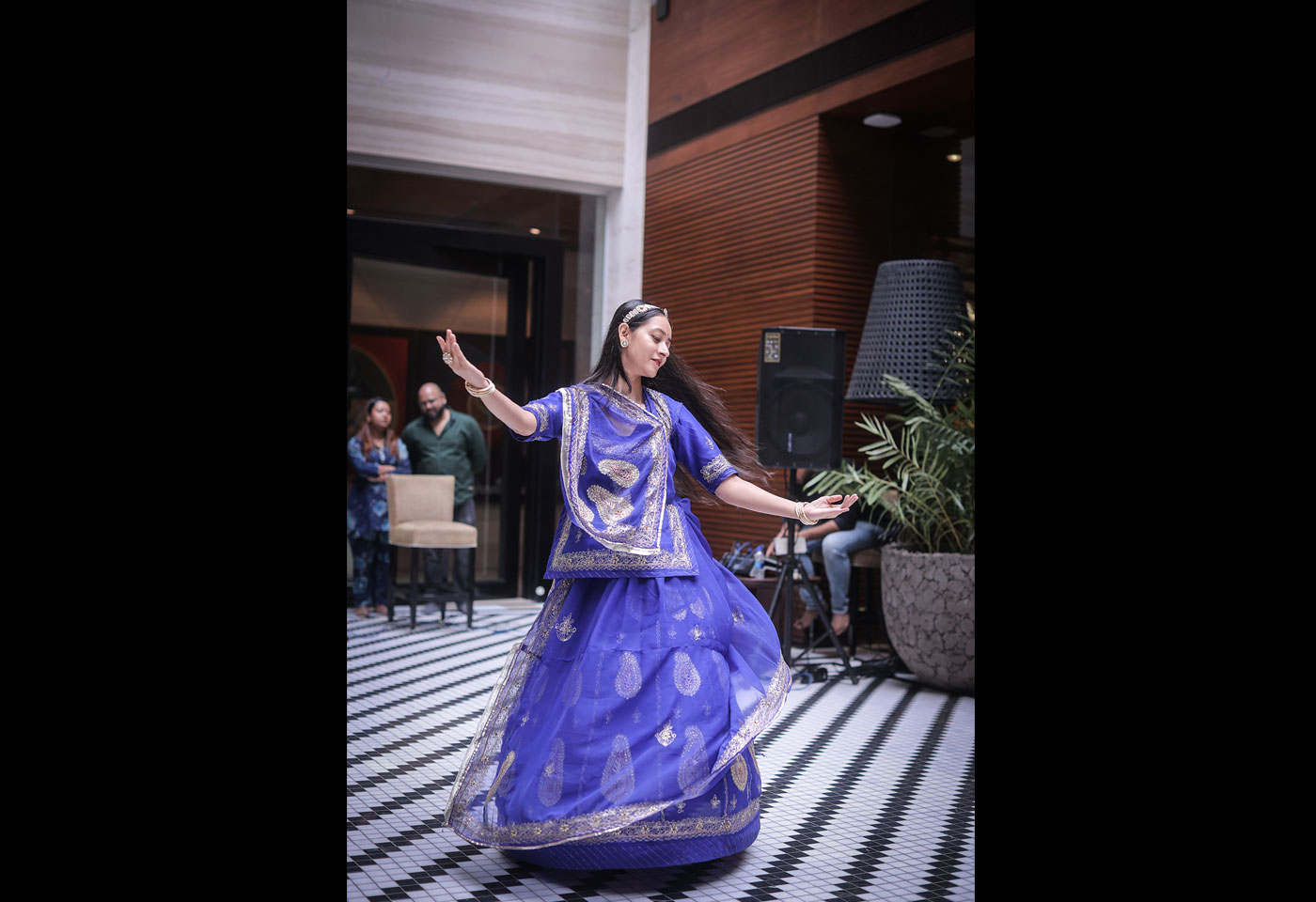
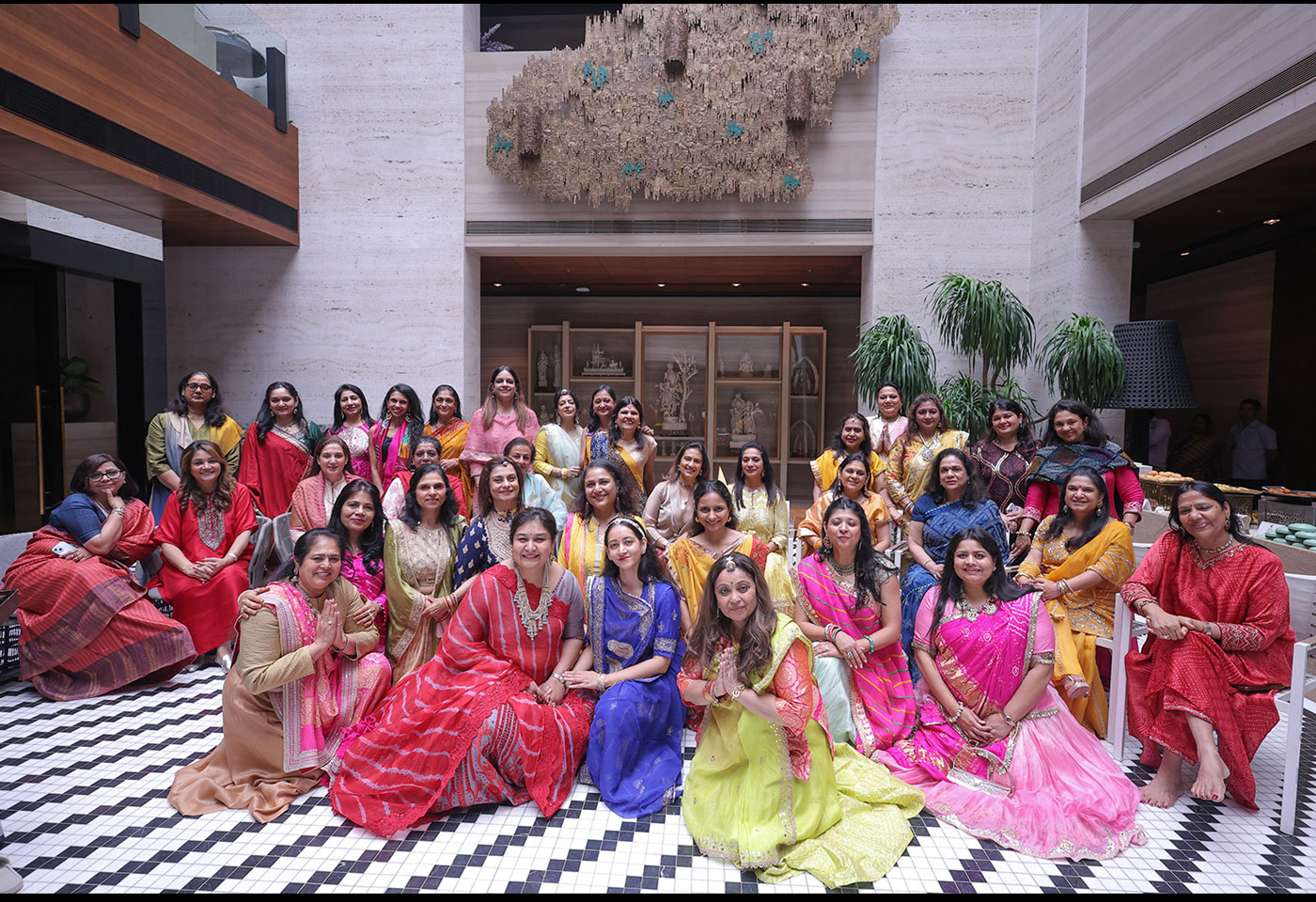
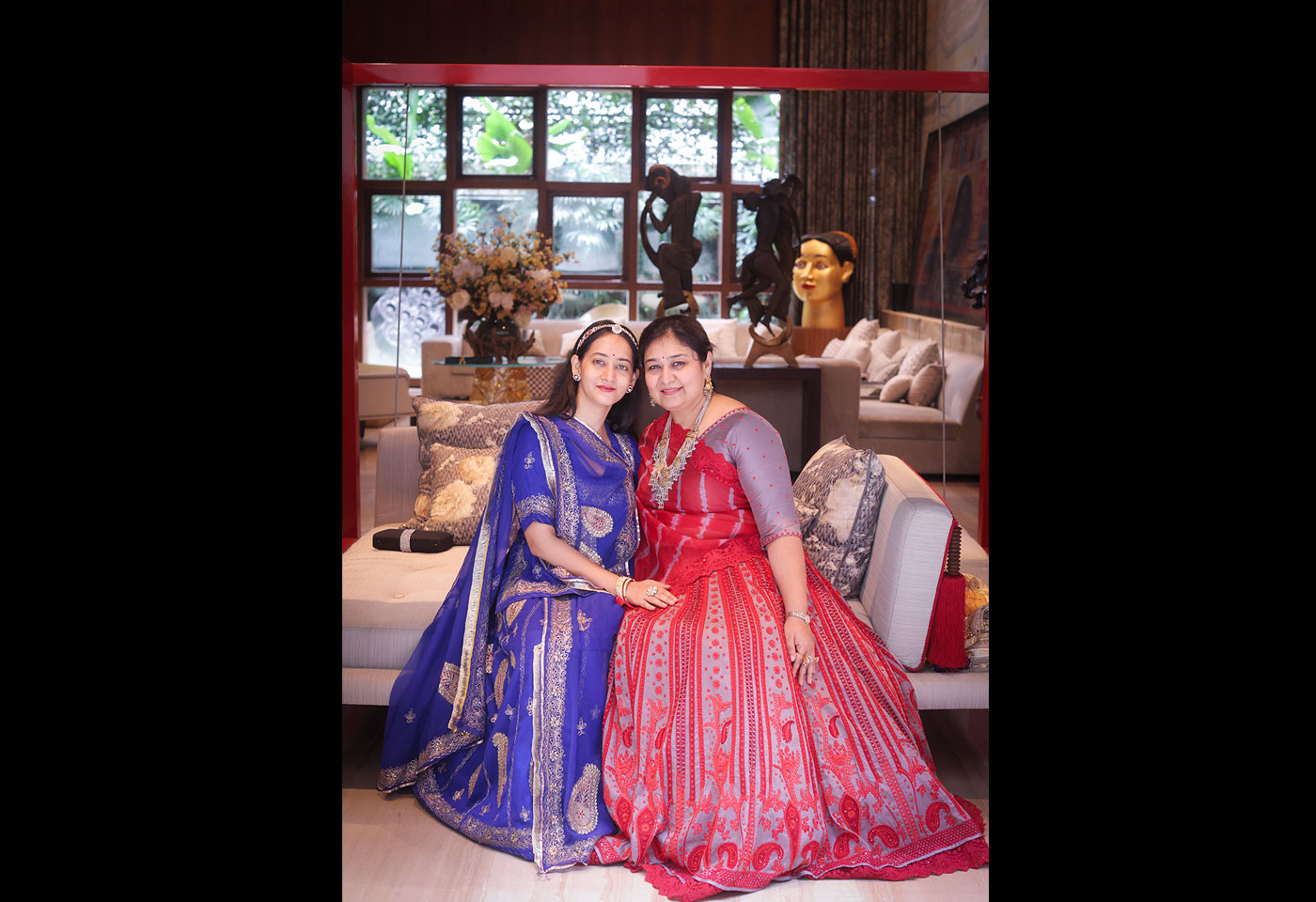
Speaker: Sanjay Garg & Nandita Palchoudhuri
Venue: Kolkata Centre for Creativity
The Ladies Study Group, under the vibrant leadership of Richa Agarwal (2025–26), hosted an illuminating session titled Decoding Sanjay Garg: Unconventional Experiences Beyond Raw Mango at the Kolkata Centre for Creativity. Moderated by cultural entrepreneur Nandita Palchoudhuri, the conversation offered a deeply personal and engaging glimpse into the mind of one of India’s most celebrated and unconventional designers.
At the heart of the discussion lay questions of identity, authenticity, and creative responsibility. Sanjay Garg’s wit and candour made for a thought-provoking exchange as he challenged ideas of validation, the definition of ‘cool’, and the pressures of designing in a fragmented yet deeply interconnected India.
From anecdotes on the importance of knowing “where you are” before designing “for whom”, to the layered complexity of India’s fashion markets, Garg urged the audience to reflect on fashion not merely as consumption, but as anthropology. He questioned the hierarchies of beauty, cost, and taste — underlining that “what is expensive or ugly is subjective; what matters is whether I do justice to my craft.”
Nandita’s incisive questions steered the conversation to explore the intersection of design and accessibility, asking if the aspirational price points of Raw Mango hinder broader inclusivity. Sanjay acknowledged this tension, asserting that his primary responsibility is towards excellence in craft — a commitment that requires both integrity and rigour.
The dialogue extended beyond design into music, memory, and everyday culture. Sanjay shared how Raw Mango’s campaigns have consistently woven music into their narratives - from folk songs to Qawwalis - reinforcing the synergy between handloom and sound. His experimental celebration of the brand’s tenth anniversary through a unique music album featuring brass bowls, African beats, and elements like ‘churan’ delighted the audience.
Personal moments brought warmth to the exchange — from shared admiration for the film Abhimaan and actors like Jaya Bachchan and Tabu, to reflections on transplanting trees and making spice dips. Questions from the audience sparked further insights: from the naming of “Raw Mango” (inspired by the overlooked value of indigenous produce like Rajasthani capers) to his favourite mishti (Mishti Doi). He also affirmed that no weaving can happen without women — a nod to the unseen yet essential contribution of women in the weaving process.
In closing, Enu Bala extended heartfelt thanks to both Sanjay and Nandita for an inspiring dialogue, and acknowledged Kolkata Centre for Creativity for curating a space that celebrates the richness of handloom and conversation. Madhu Neotia felicitated the guest with a token of appreciation, marking a fitting end to an evening that was as insightful as it was unconventional.
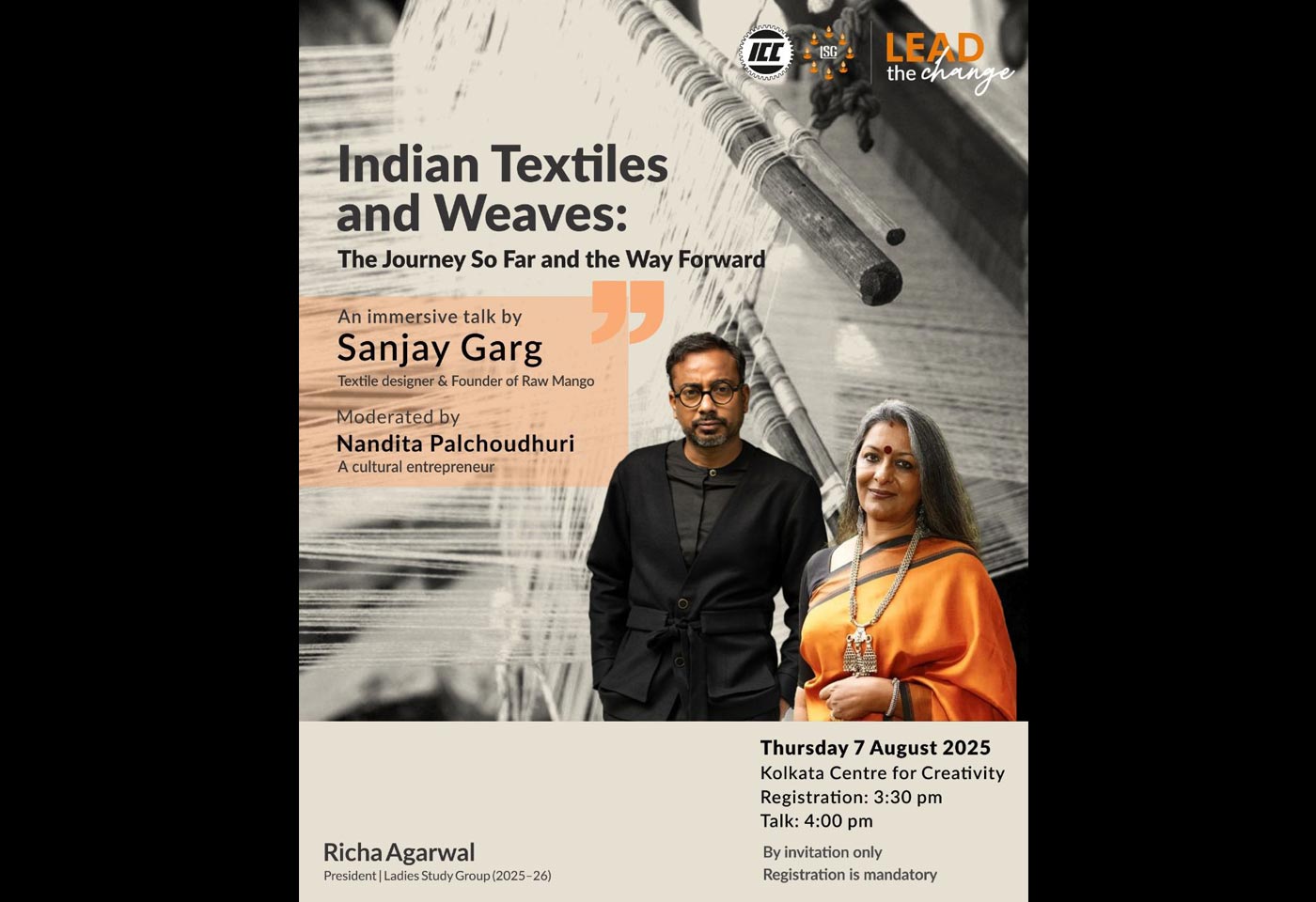
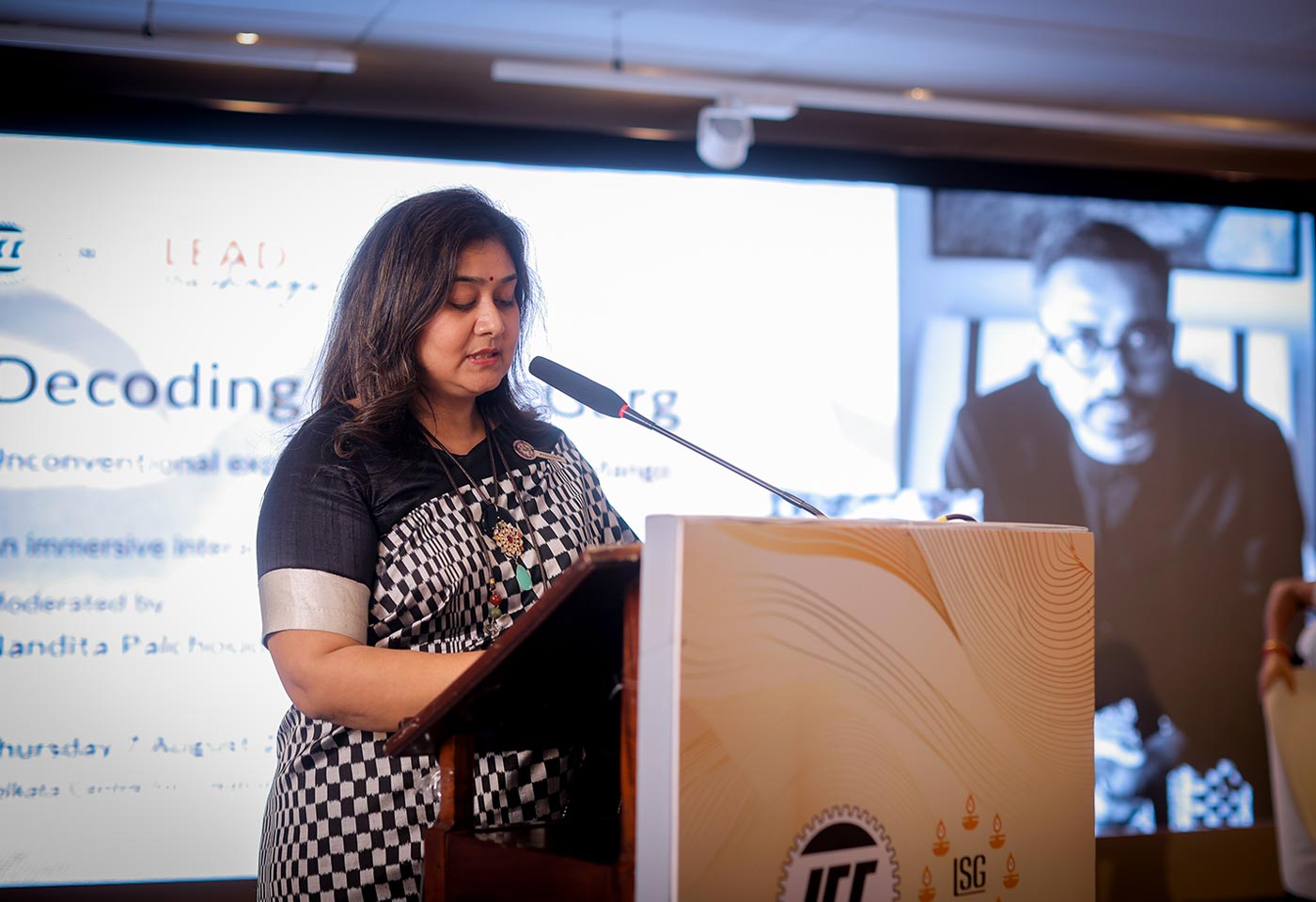
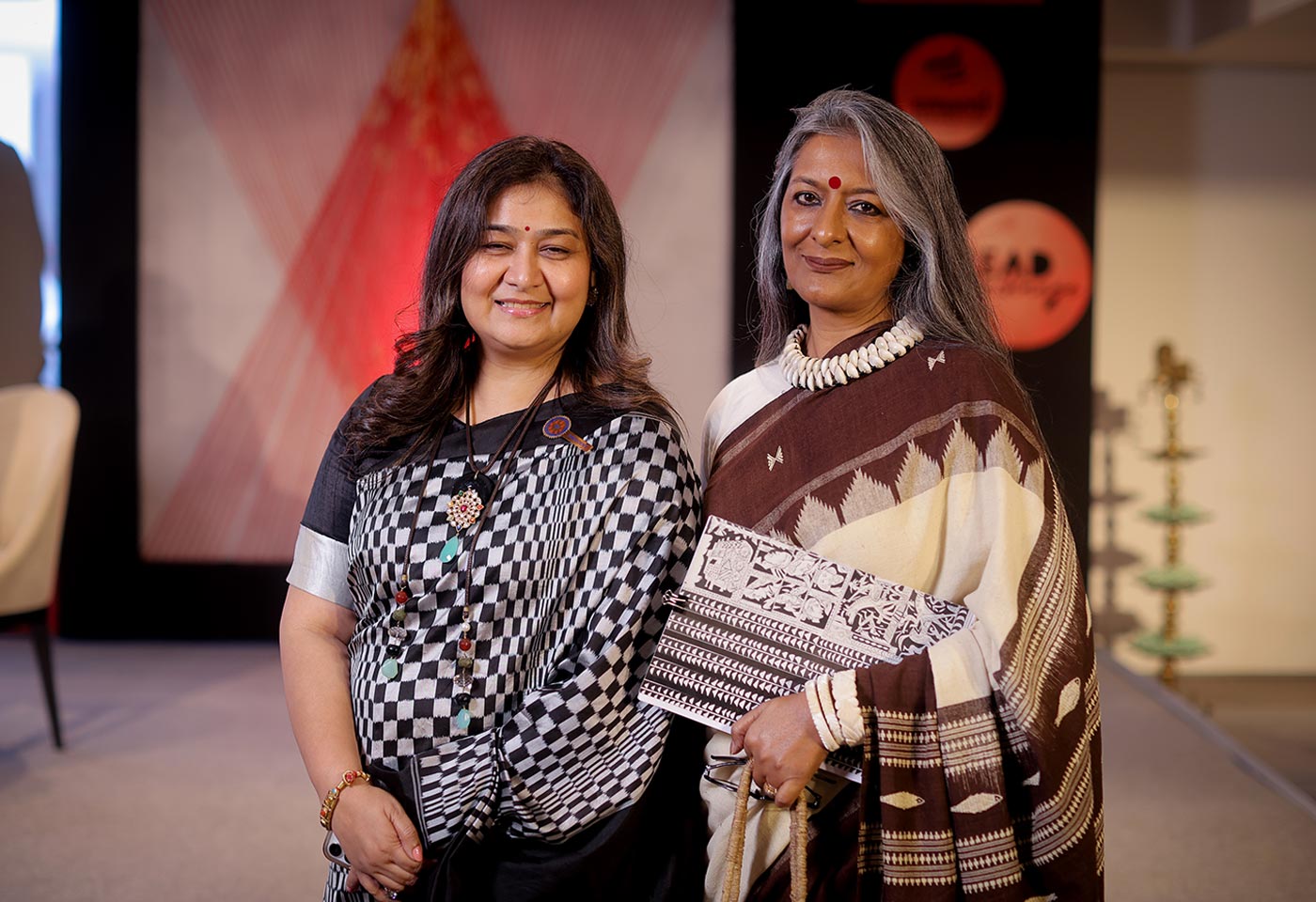
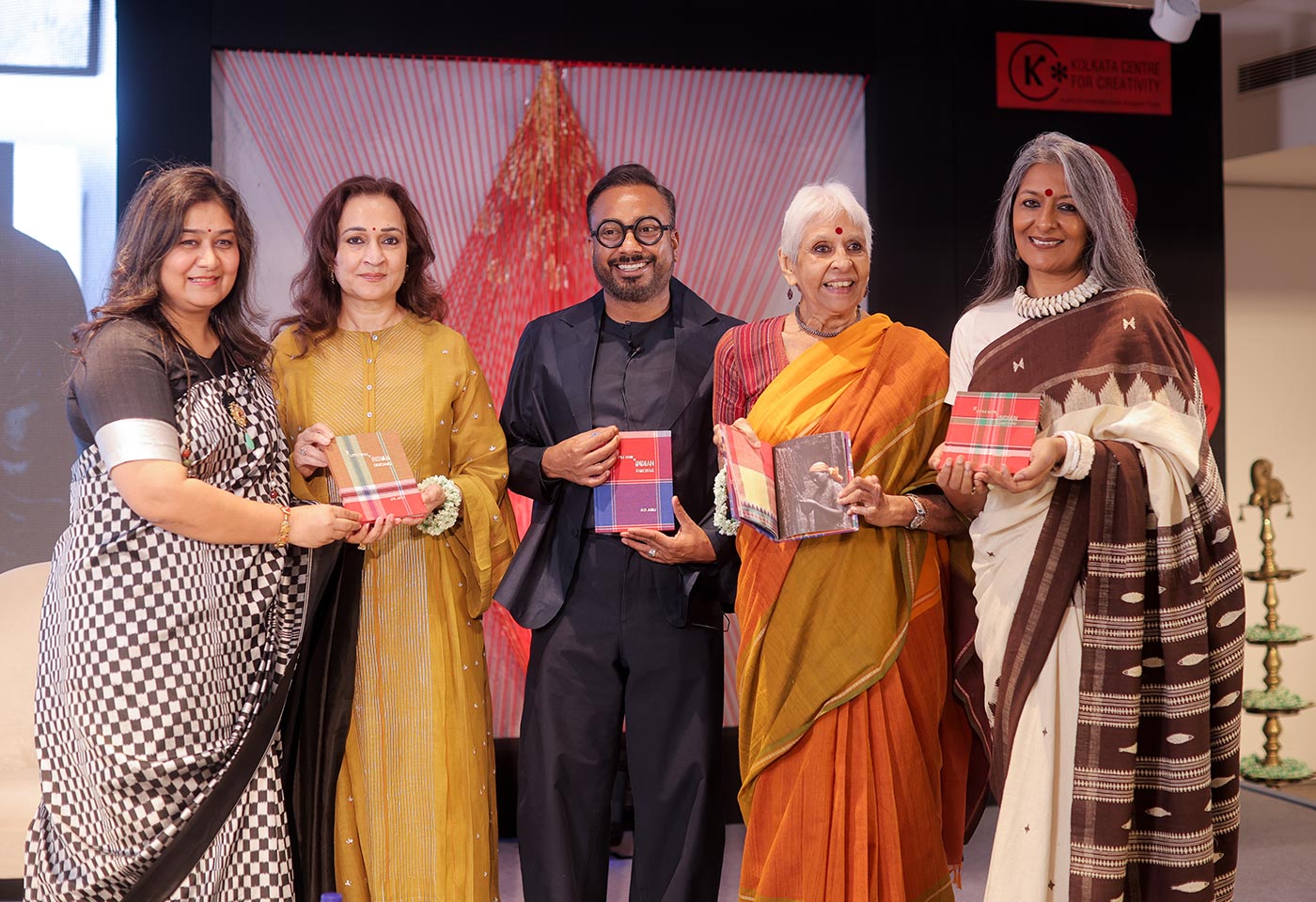
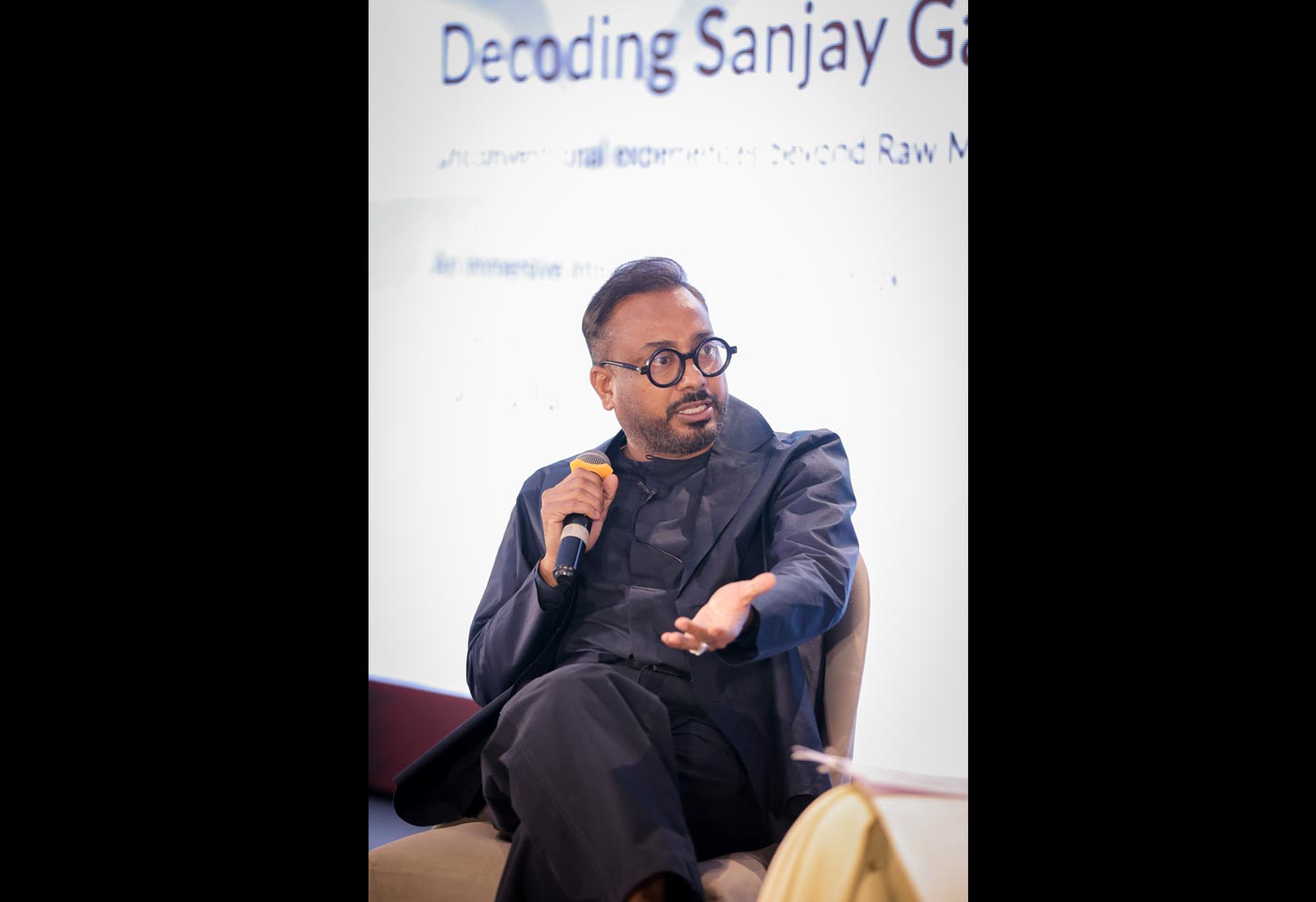
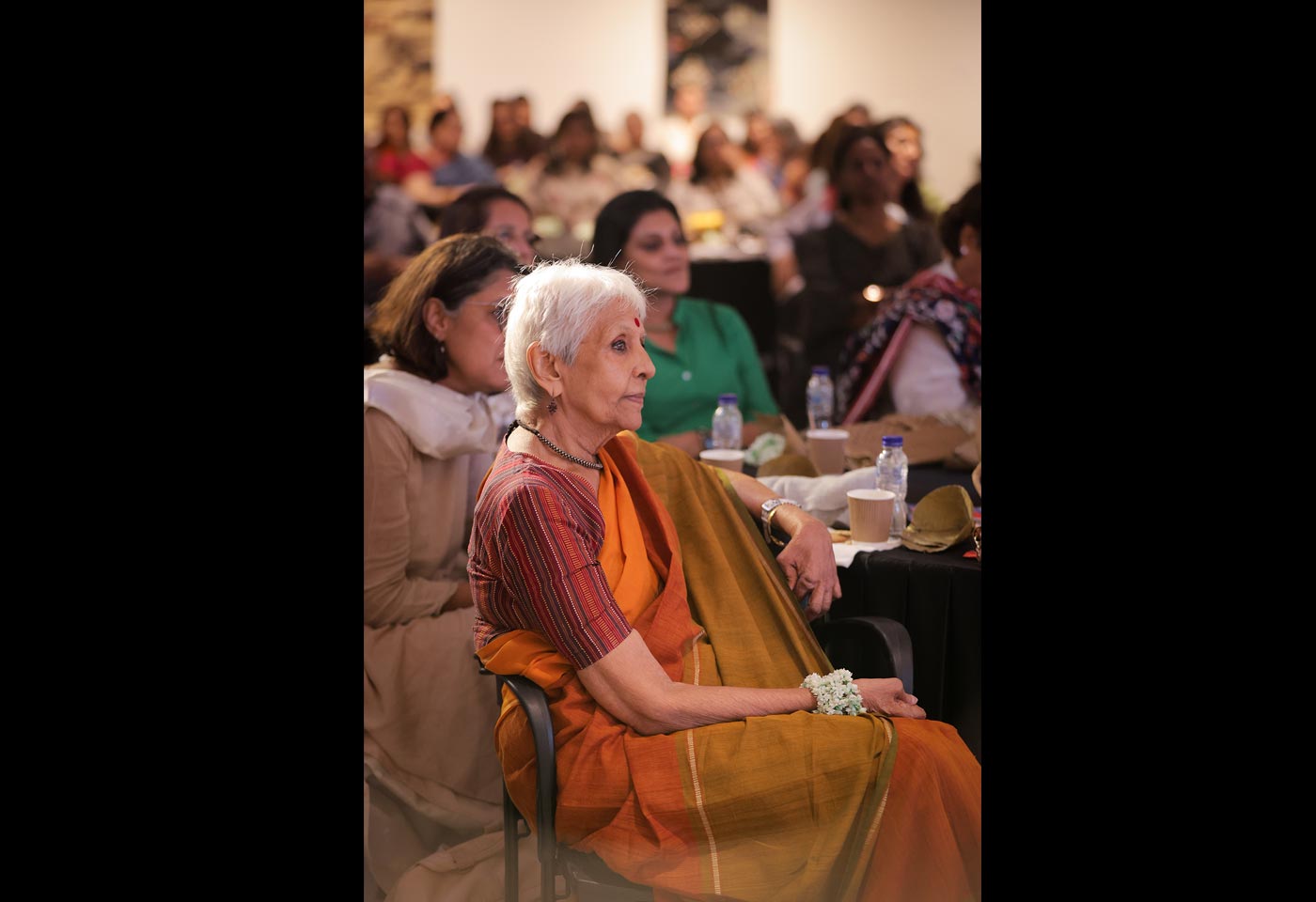
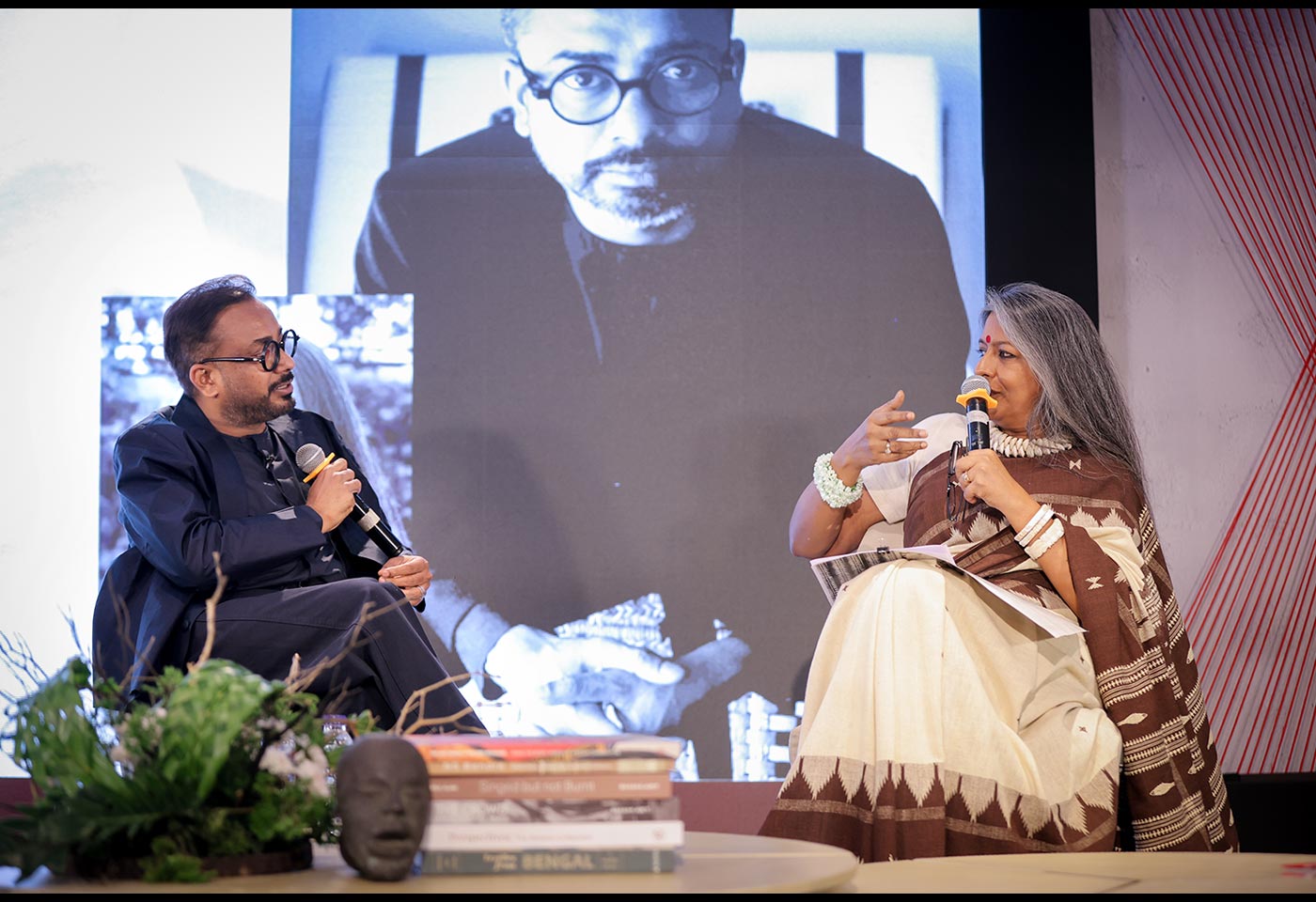
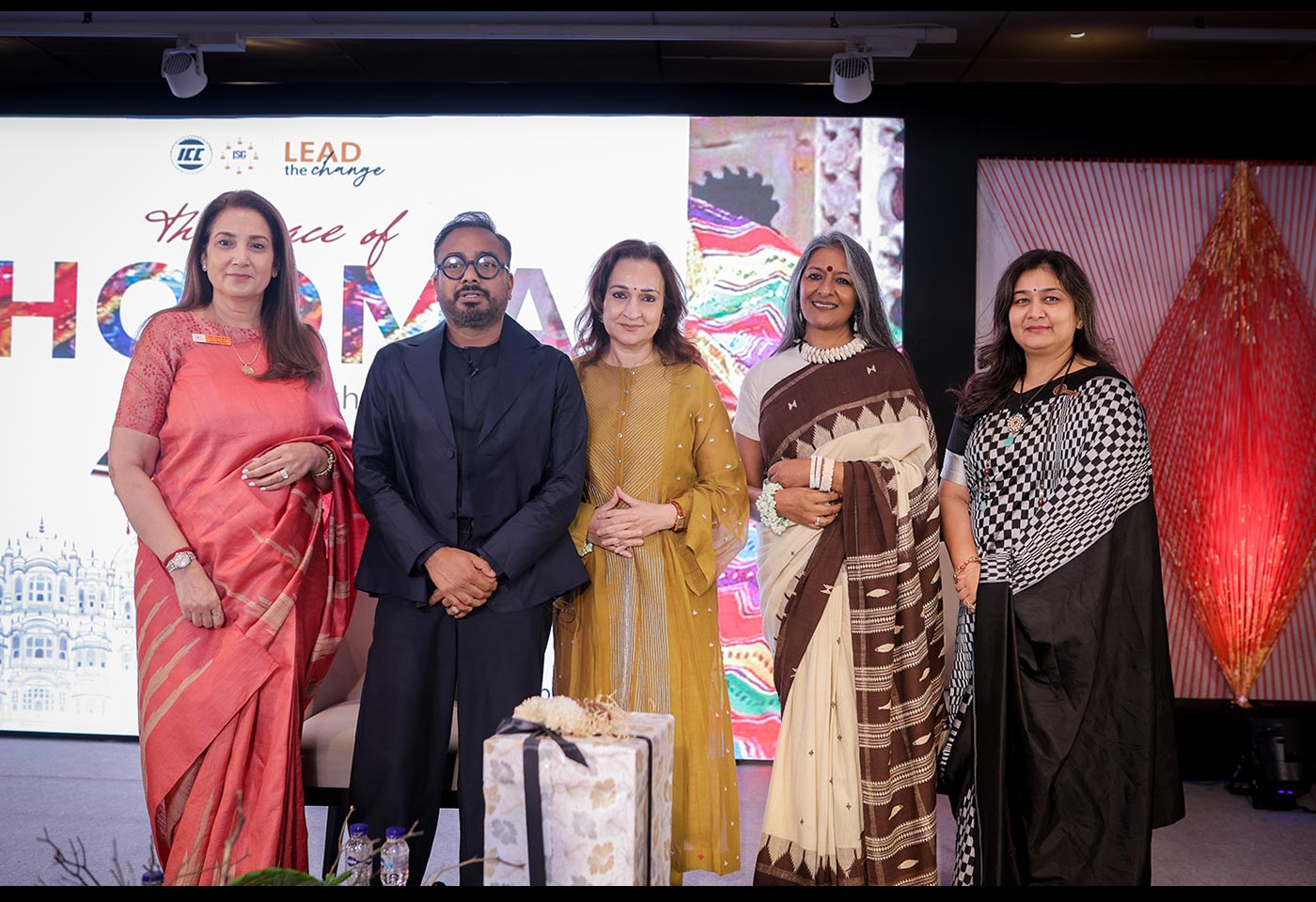
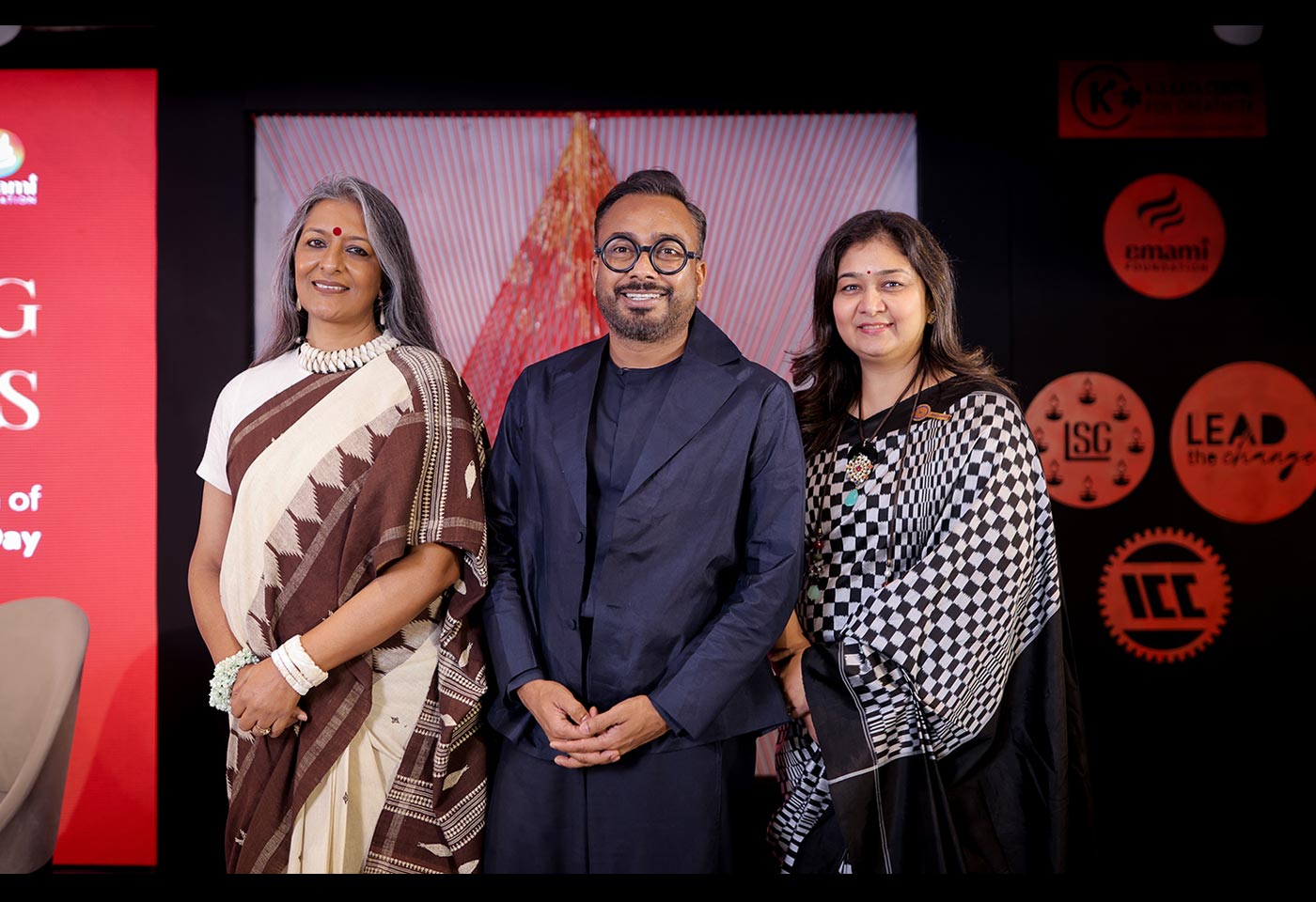
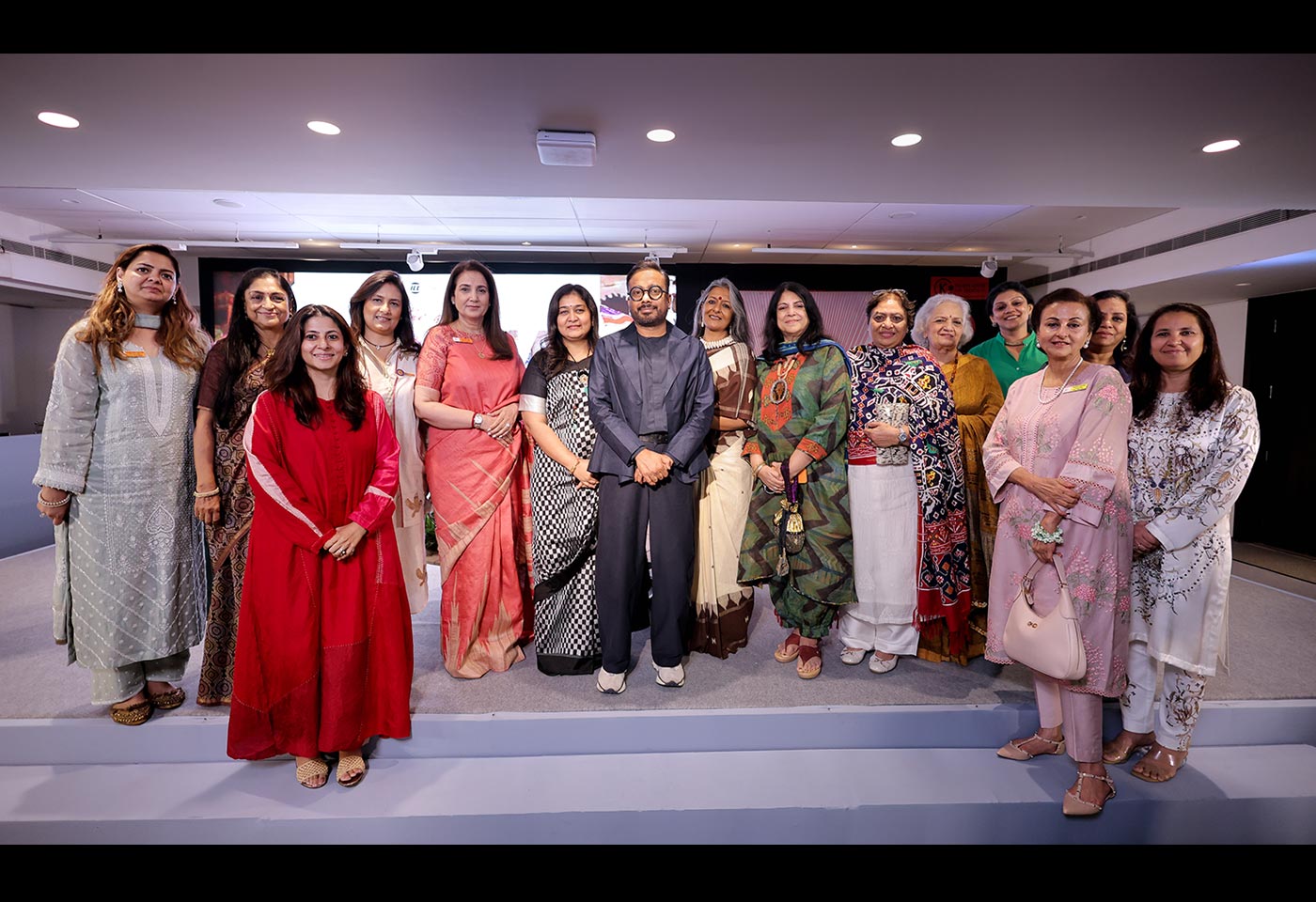
Speaker: Tishani Doshi and moderated by Ina Puri
Venue: Kolkata Centre for Creativity
The Ladies Study Group (LSG) presented a thought-provoking and artistically rich afternoon titled “Girls Are Coming Out of the Woods”—a unique convergence of poetry, dance, and dialogue led by acclaimed poet, writer, and dancer Tishani Doshi. Held at the Kolkata Centre for Creativity, this exclusive, by-invitation-only event witnessed a powerful and immersive performance that bridged literature, movement, and social critique.
The session began with Tishani Doshi elocuting select pieces from her body of work—poems that vividly explored themes of womanhood, identity, trauma, and resilience. Each poem was then embodied through movement as she transitioned seamlessly into expressive dance performances. With striking physicality and lyrical strength, Doshi brought her words alive, making the audience not just hear but feel the layered emotional and psychological landscapes of her narratives. Her performance transformed the stage into a space of healing, confrontation, and collective reflection.
Following the performance, Ina Puri—renowned arts commentator, writer, and curator—moderated an intimate and insightful conversation with Doshi. The dialogue spanned themes central to Doshi’s work: the persistent violence—both visible and invisible—that women endure in society, and the lingering impacts this has on the body and the psyche. Doshi reflected on how women carry and negotiate trauma, and how creative expression—especially performance—becomes a vital space for reclaiming voice and agency.
She spoke with quiet intensity about the status of women in contemporary society, underscoring the internal and external battles they face daily. Her reflections on how cultural narratives often silence or obscure female pain were both personal and universal, urging the audience to consider the power of storytelling and embodied performance as acts of resistance and reclamation.
As the programme drew to a close, Ritu Almal took the stage to deliver the Vote of Thanks. With warmth and eloquence, she expressed deep appreciation to Tishani Doshi for her evocative performance and courageous storytelling, to Ina Puri for steering the conversation with empathy and depth, and to the audience for engaging so wholeheartedly with the experience. Her words reflected the collective resonance in the room and the impact of an event that moved both heart and mind.
Curated with care under the leadership of Richa Agarwal, President of the Ladies Study Group (2025–26), the session exemplified the LSG’s ongoing commitment to presenting intellectually and emotionally resonant programming that empowers thought and inspires action.
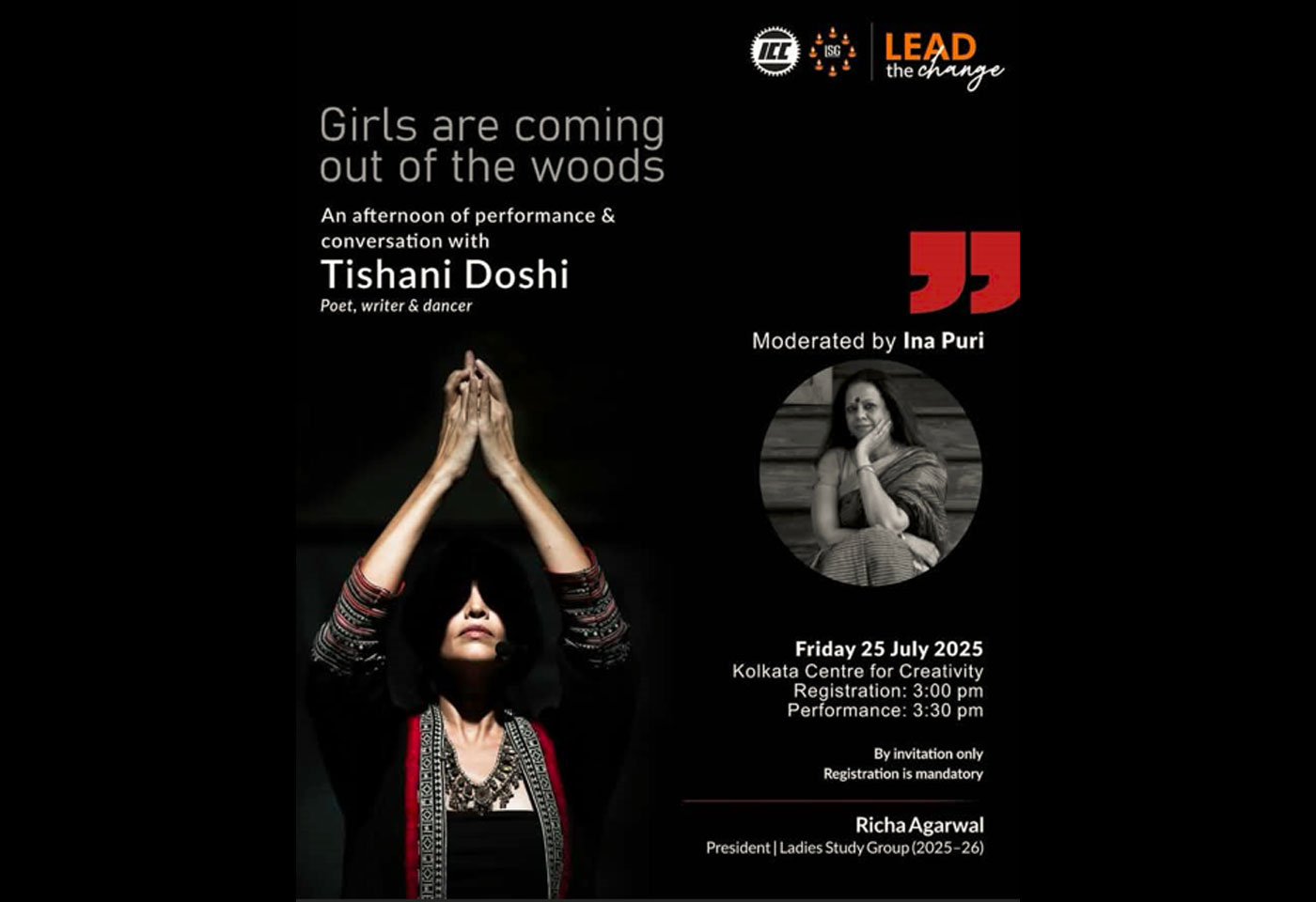
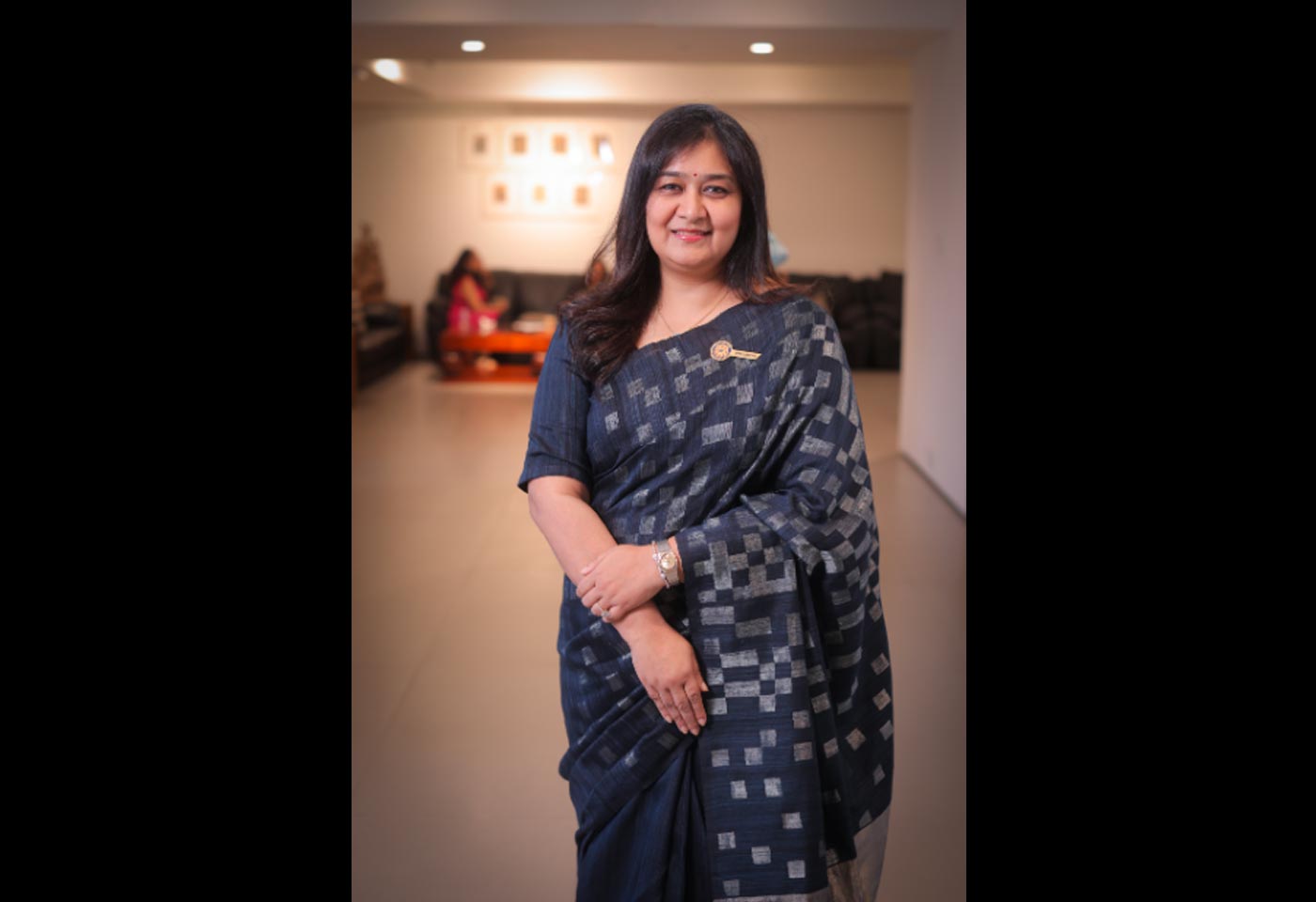
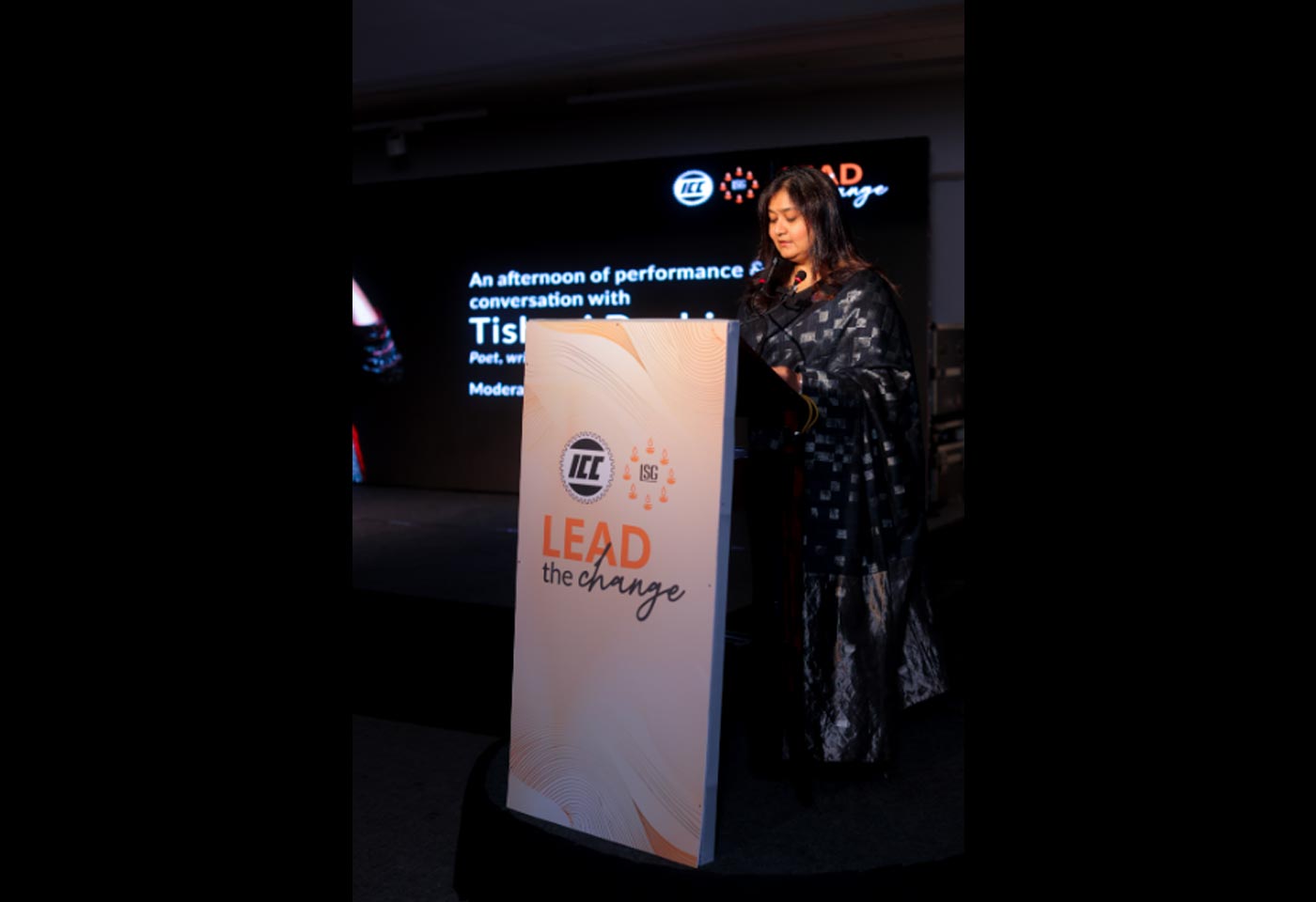
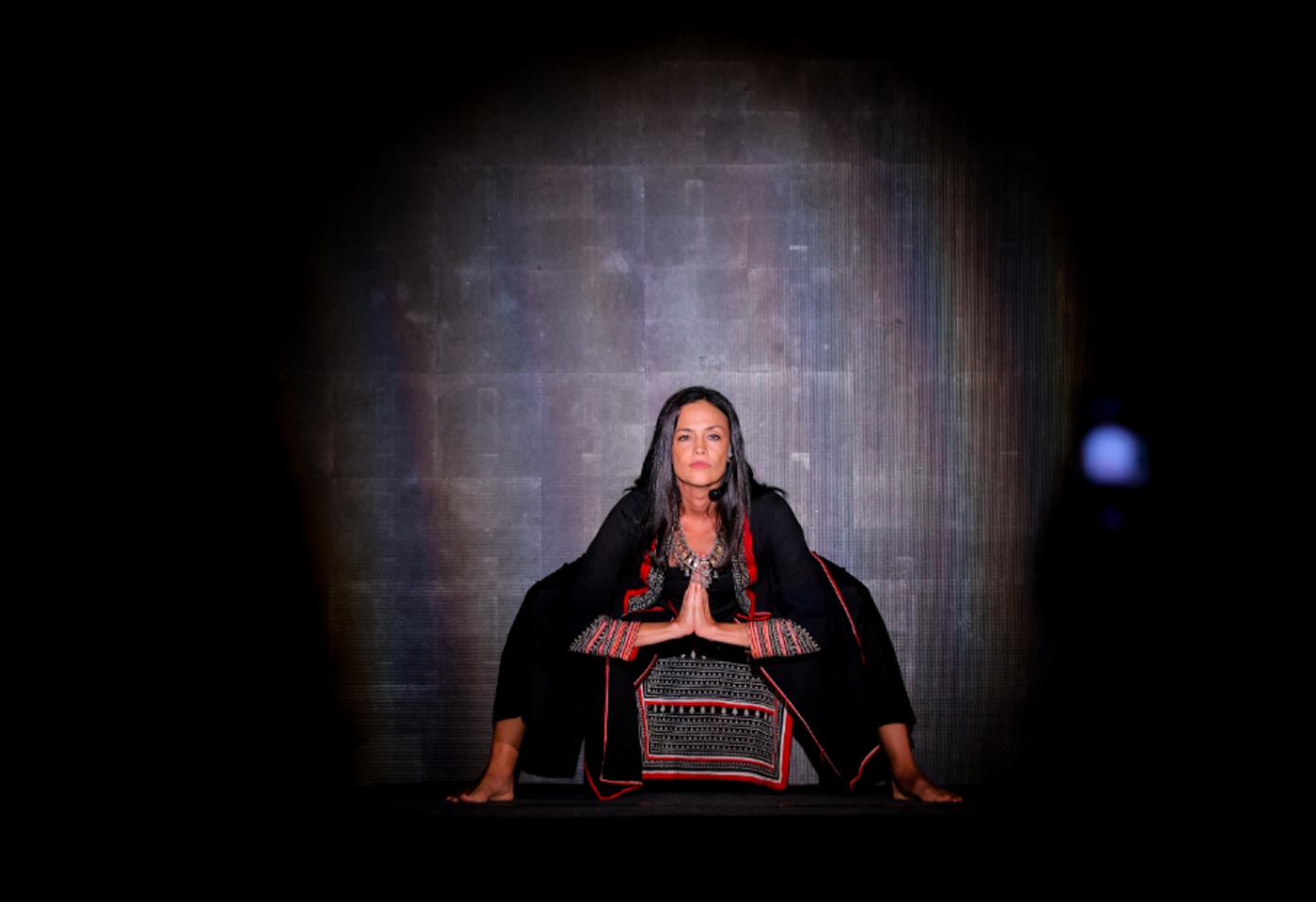
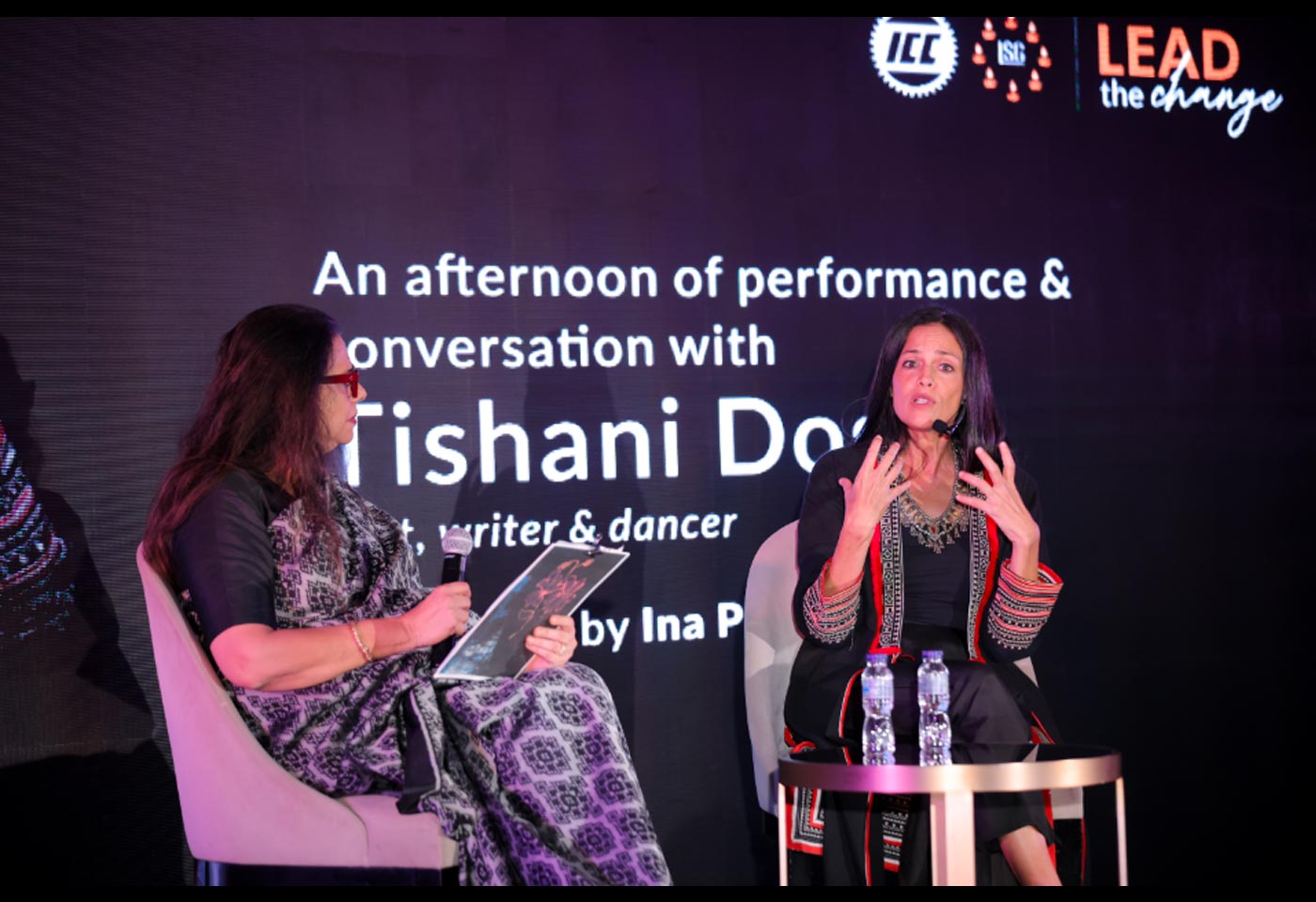
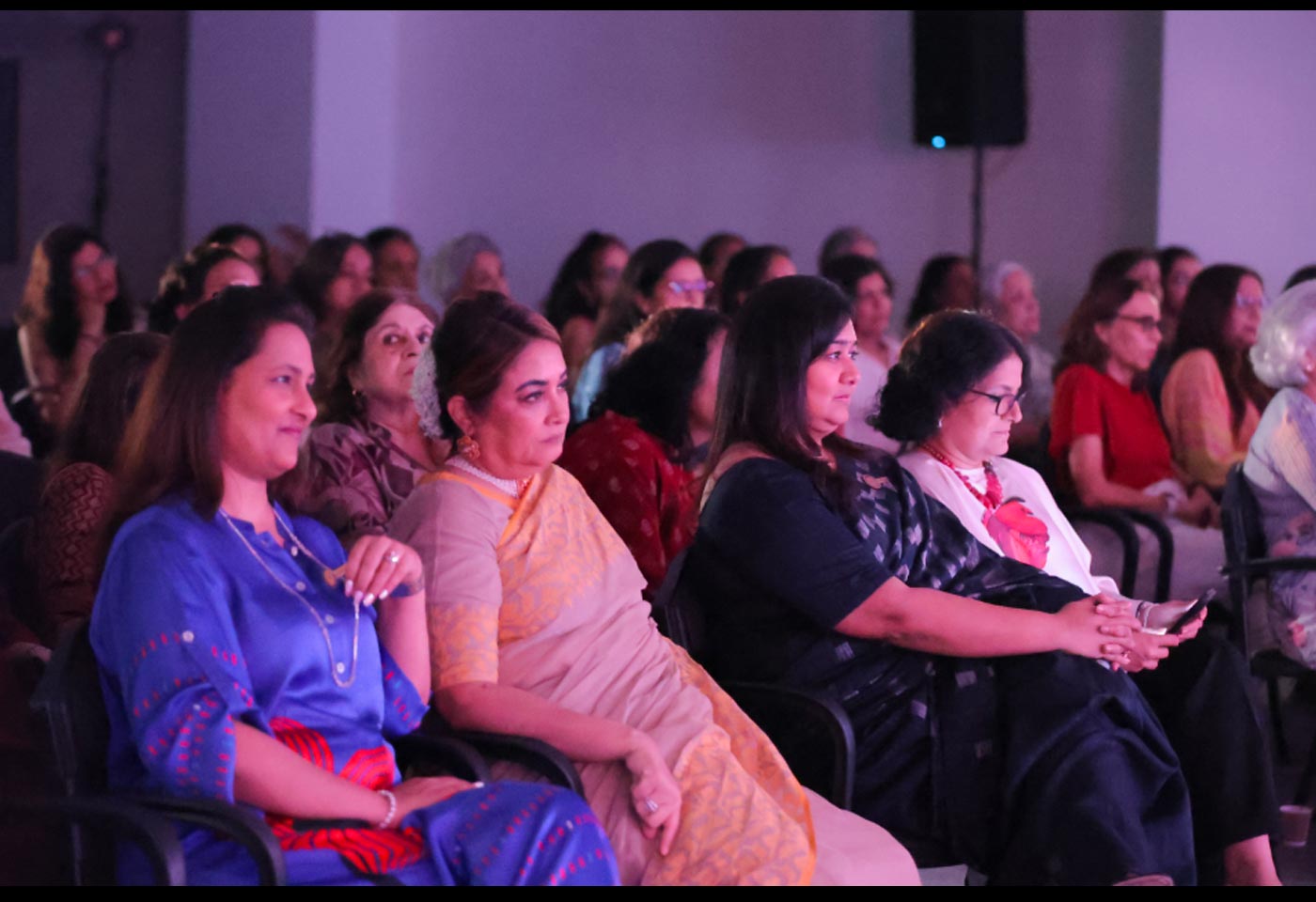
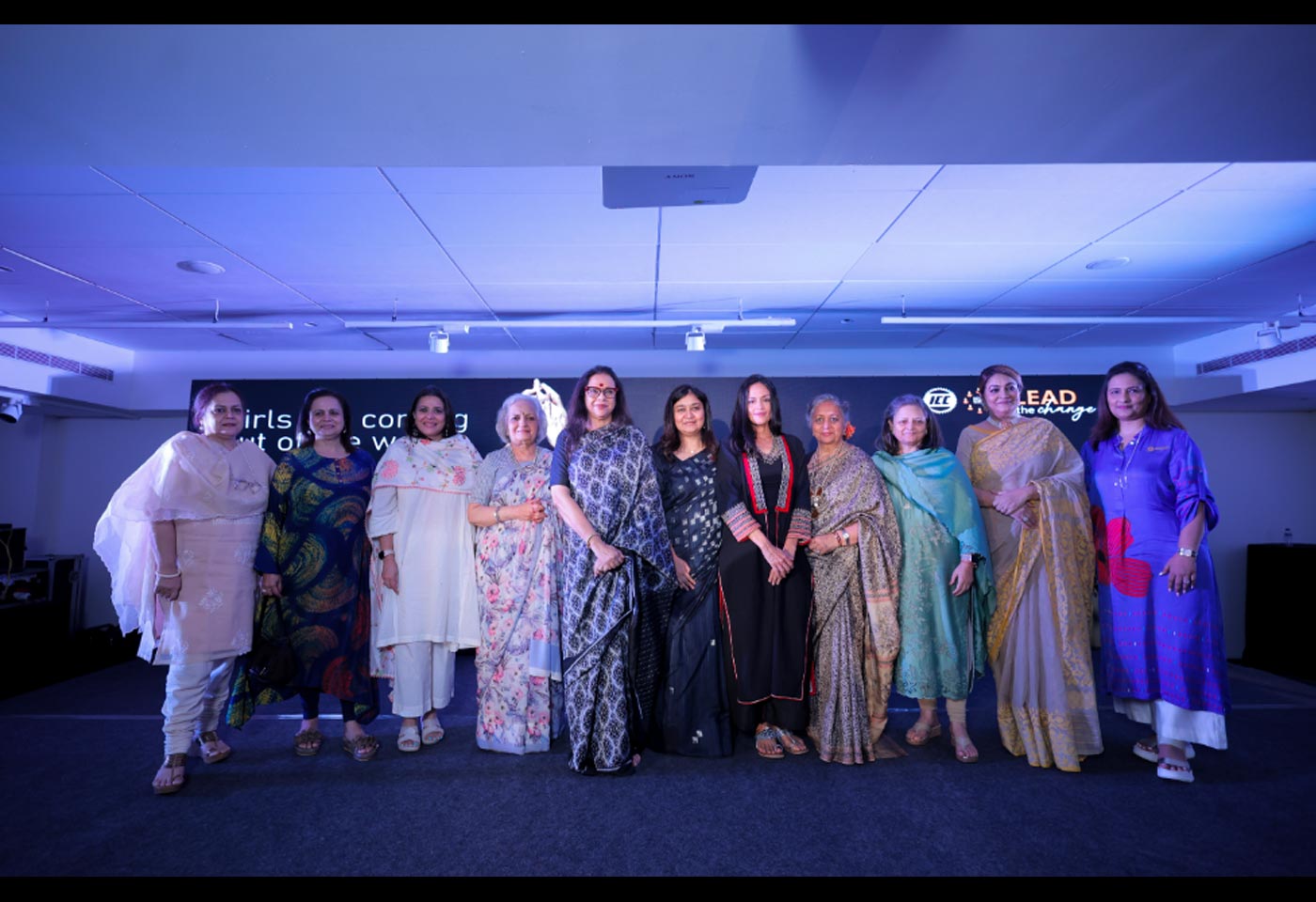
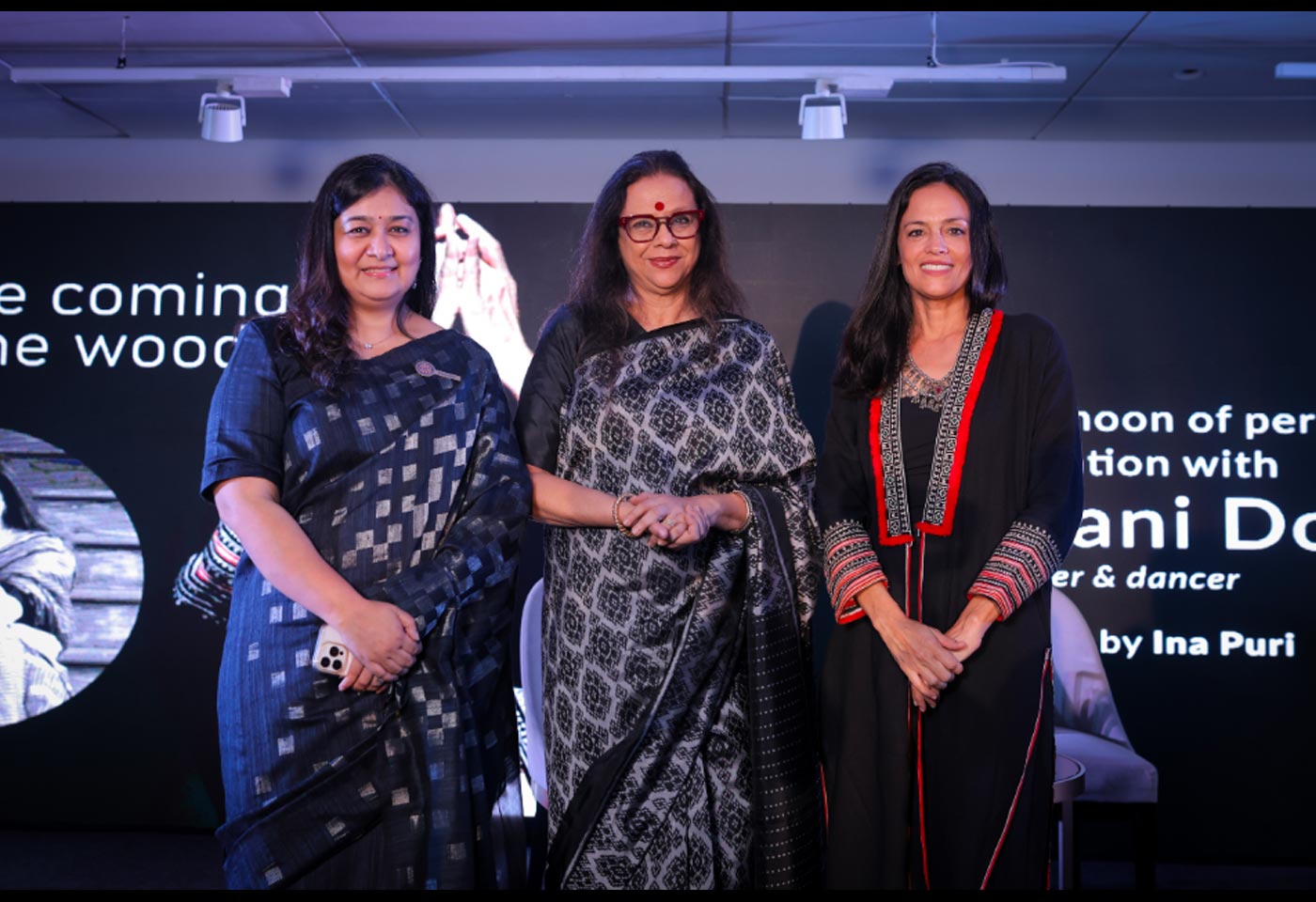
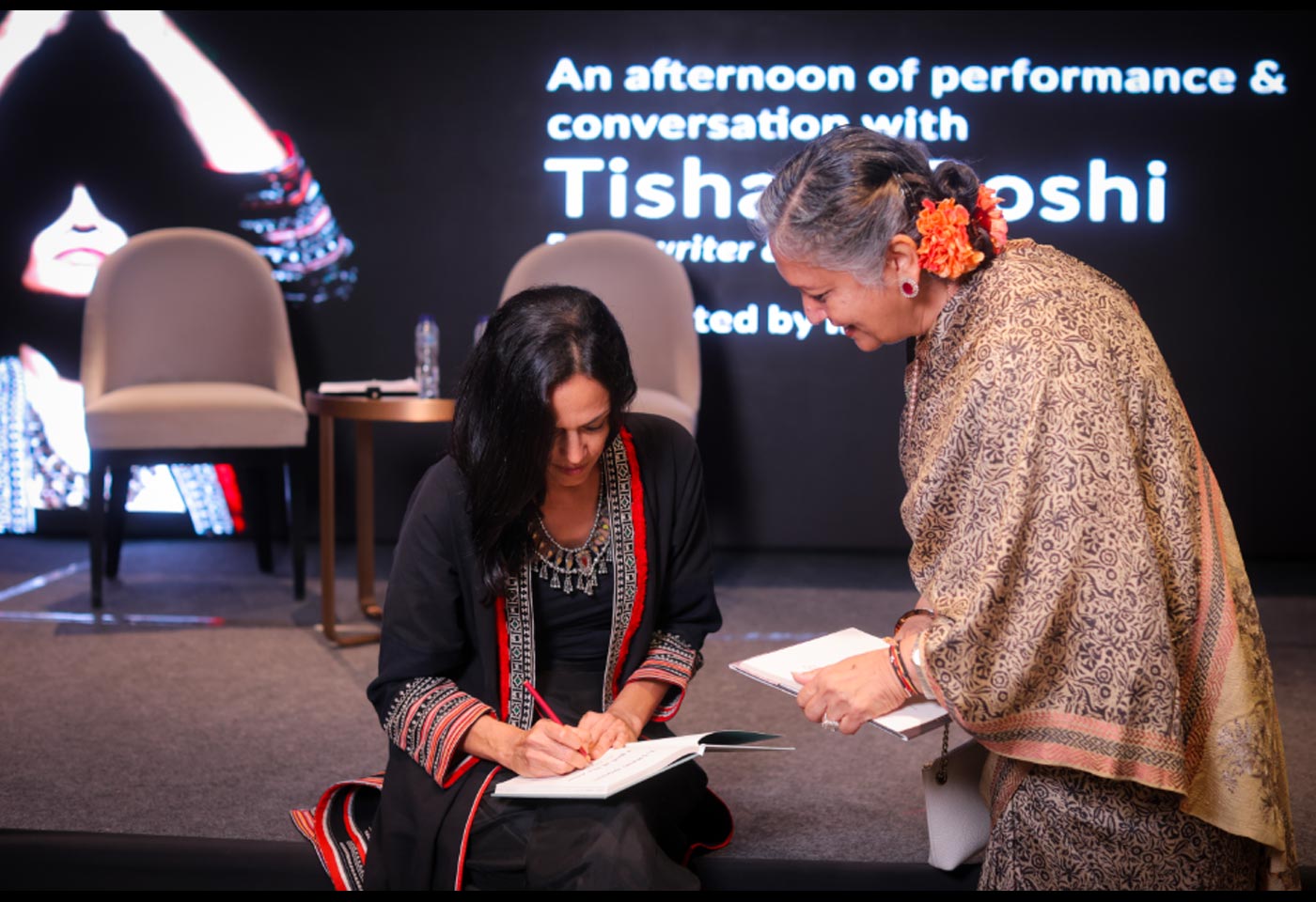
Speaker: Dr. Tatwamasi Dixit
Venue: Pala, ITC Sonar
On 23rd July, The Ladies Study Group hosted an insightful and transformative workshop titled “Lead Your Own Change” featuring Dr Tatwamasi Dixit, a distinguished advisor to leading family businesses, at PALA, ITC. This exclusive, invitation-only event explored the nuanced dynamics of family-run enterprises, with particular emphasis on individual purpose, leadership, and the evolving role of women within such structures.
Dr Dixit opened the session by invoking the powerful symbol of Ardhanaareeshwara, drawing parallels between divine balance and the necessity for equilibrium in family businesses. He connected this idea to the Chinese philosophy of Yin and Yang, underscoring the significance of both feminine energy (Shakti) and masculine structures in sustaining family and enterprise alike. In his view, the longevity of a family business depends on maintaining balance—not just between business and family needs, but also in acknowledging the role of both the patriarch and matriarch.
One of the central themes of the workshop was perpetuity—not merely as a generational handover but as a continuum rooted in values and purpose. Dr Dixit challenged the audience to consider whether their families viewed the business as a collective legacy or the responsibility of a single successor. He advocated for greater clarity, especially when the next generation feels compelled to participate in the business solely due to birth rather than choice.
A significant portion of the session was dedicated to the challenges women face in family businesses. Dr Dixit presented Indian statistics that revealed the underrepresentation and undervaluation of women in these roles. He highlighted issues such as male succession bias, the invisibility of women’s contributions, and the societal hesitation in recognising their leadership capabilities. Despite their innate financial prudence and commitment, many women remain unthanked and unseen. However, as age-old traditions give way to contemporary legal rights, a slow but sure shift is underway.
He introduced the Four Circle Model, describing the four interdependent dimensions of a family business: Ownership, Business, Family, and Individual. He emphasised the need for balance among these “wheels”, likening them to the structure of a car—disproportion in any one area can cause derailment. The model served as a framework for key principles such as stewardship, profitability, entrepreneurship, inclusion, and harmony.
The session featured several thought-provoking activities. In the first, participants were asked to reflect on which of the four circles currently dominated their family business, and which one required more attention. They were then invited to draw their own version of the four-circle diagram, facilitating a personal roadmap for change.
Another empowering segment encouraged participants to define themselves using a set of adjectives—an introspective exercise titled “Who Am I?”—to help clarify personal identity within the family and business ecosystem. This was followed by an exploration of the concepts of Platform and Purpose, and how their alignment determines whether one is a consumer, survivor, legacy builder, or path breaker.
A culminating exercise asked attendees to consider deeper questions about their life’s purpose: How do you wish to be remembered? What legacy do you aspire to leave? This guided the audience from personal introspection towards a broader systemic perspective, weaving the thread from self to system with purpose as the guiding principle.
The following served as interesting take aways from the session:
1. Dr Dixit redefined commonly accepted labels such as introvert and extrovert, encouraging participants to look beyond behavioural stereotypes and instead understand individual roles in the context of family systems and purpose.
2. The workshop challenged traditional notions of love, reframing it as an active force of stewardship, contribution, and alignment within the family business - far beyond emotional attachment.
3. Identity was explored as a dynamic and evolving concept, not fixed by roles or relationships but shaped by purpose, self-awareness, and one's contribution to the collective.
4. Participants were urged to stop confusing proximity with connection—physical presence does not guarantee emotional or strategic alignment in a family enterprise.
5. The concept of choice was given great importance—particularly for the next generation—highlighting that being born into a business family does not automatically mandate participation in the business.
6. Dr Dixit emphasised the importance of reflective leadership—that real transformation begins with self-inquiry before structural or organisational change.
The event concluded with a heartfelt vote of thanks delivered by Dr Rupali Basu, acknowledging the profound insights shared by Dr Dixit and the thoughtful participation of all attendees.
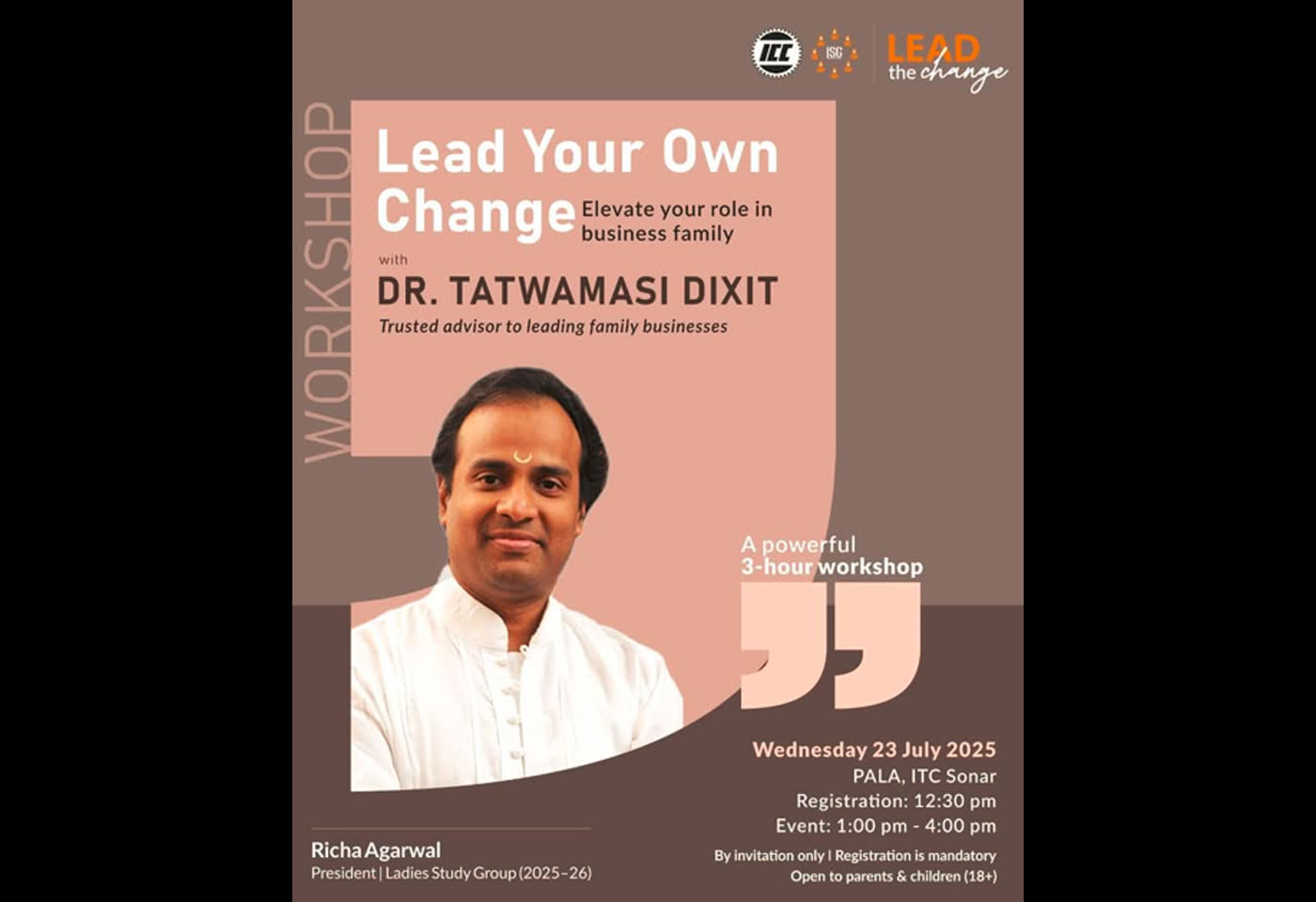
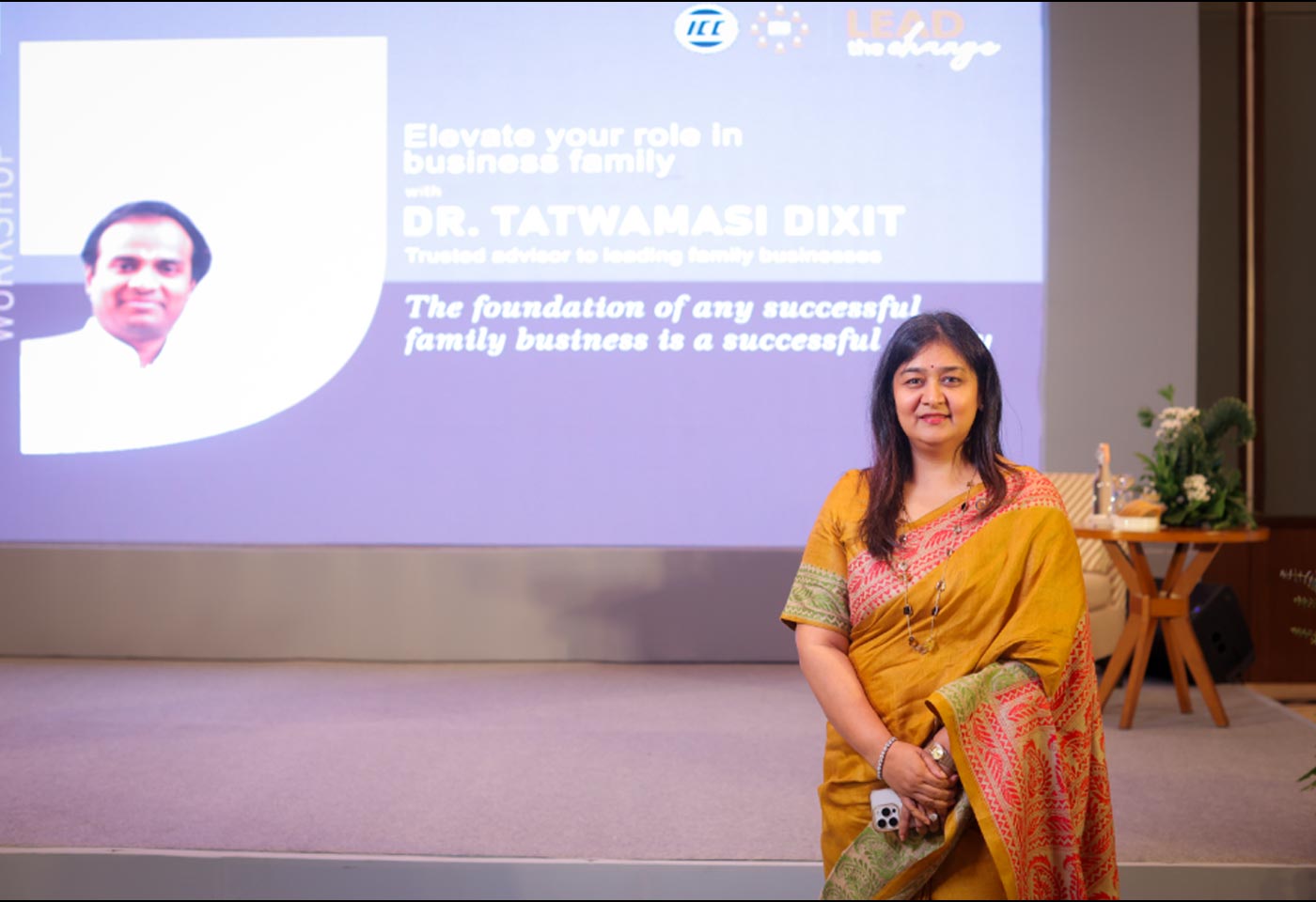
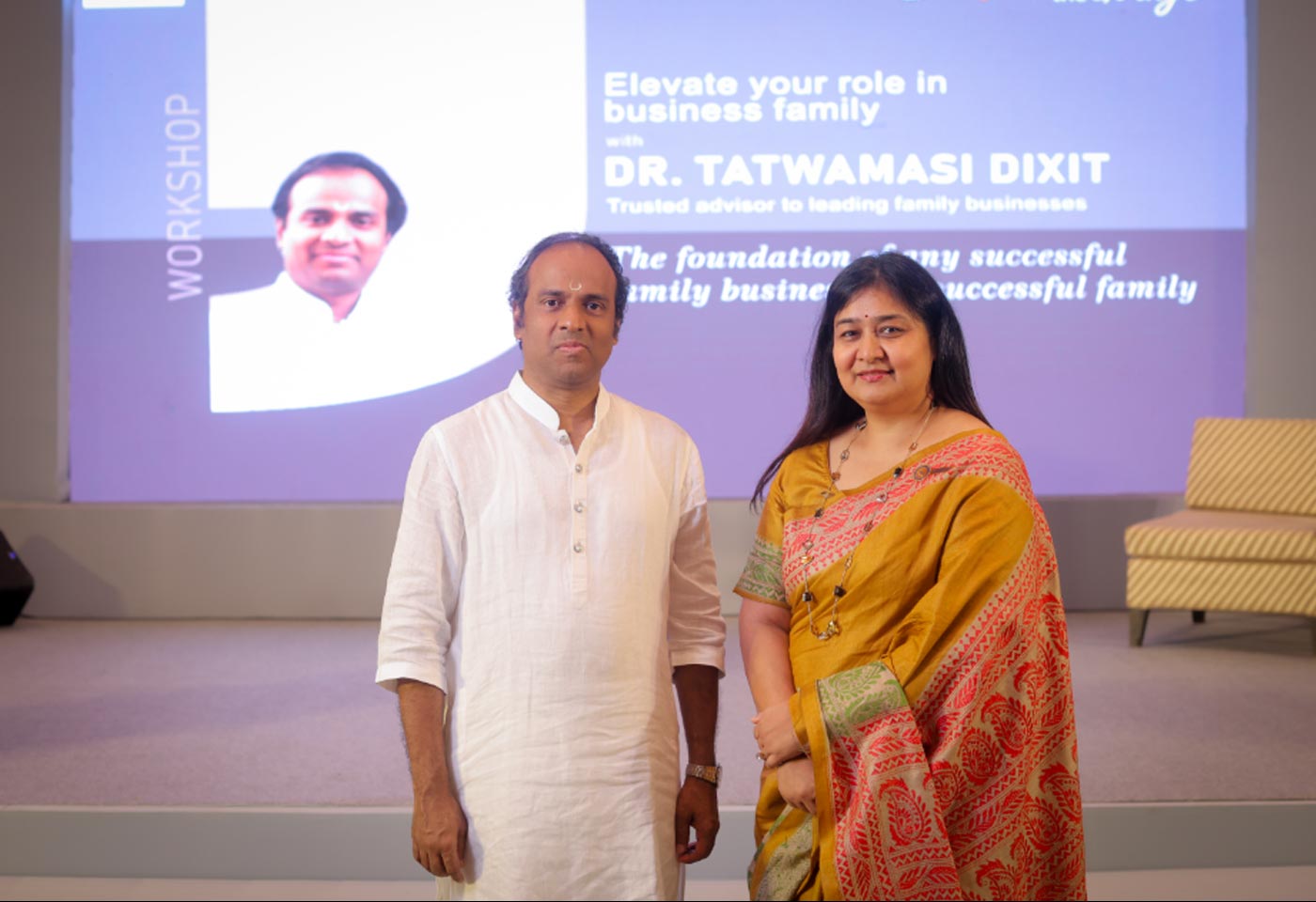
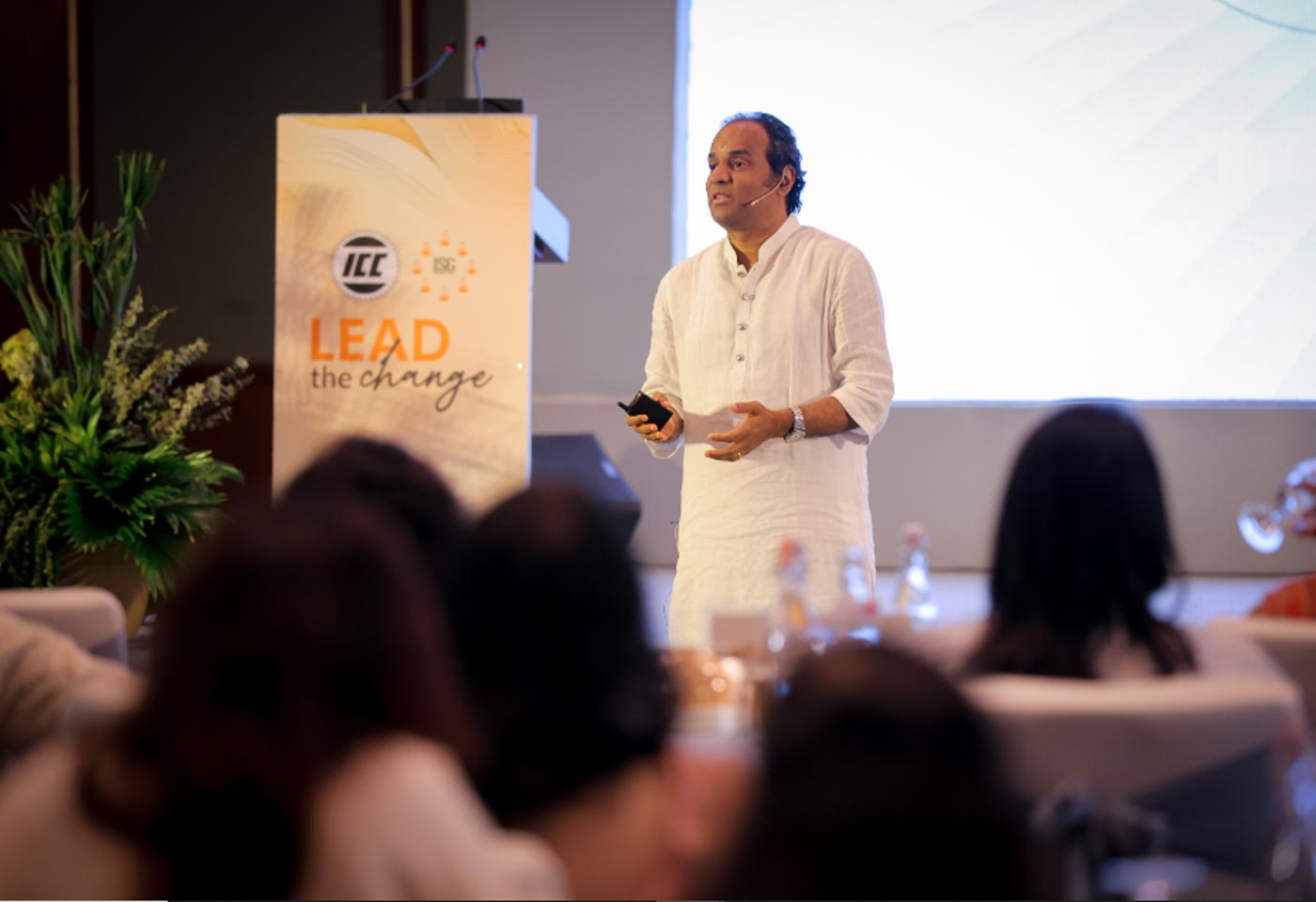
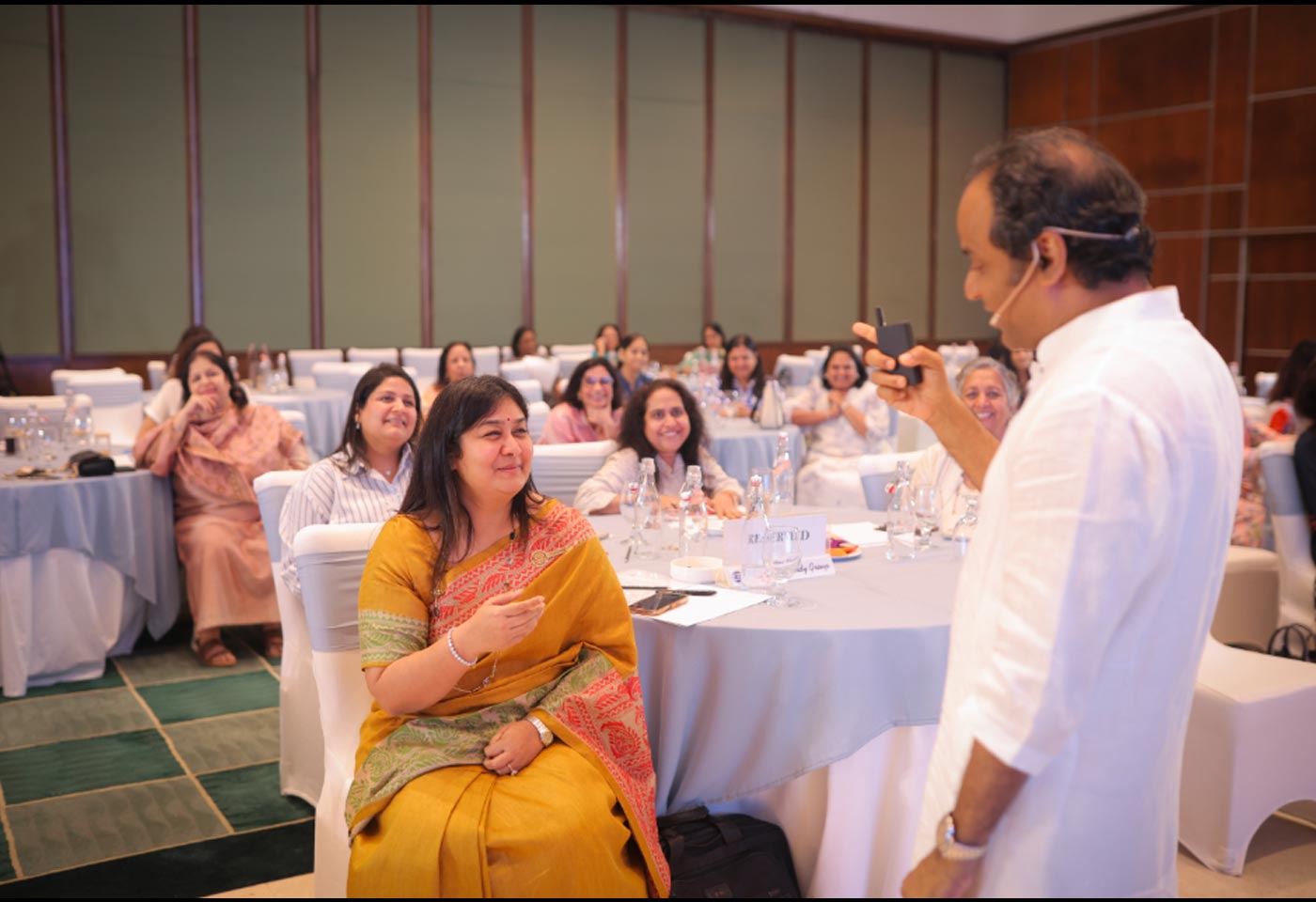
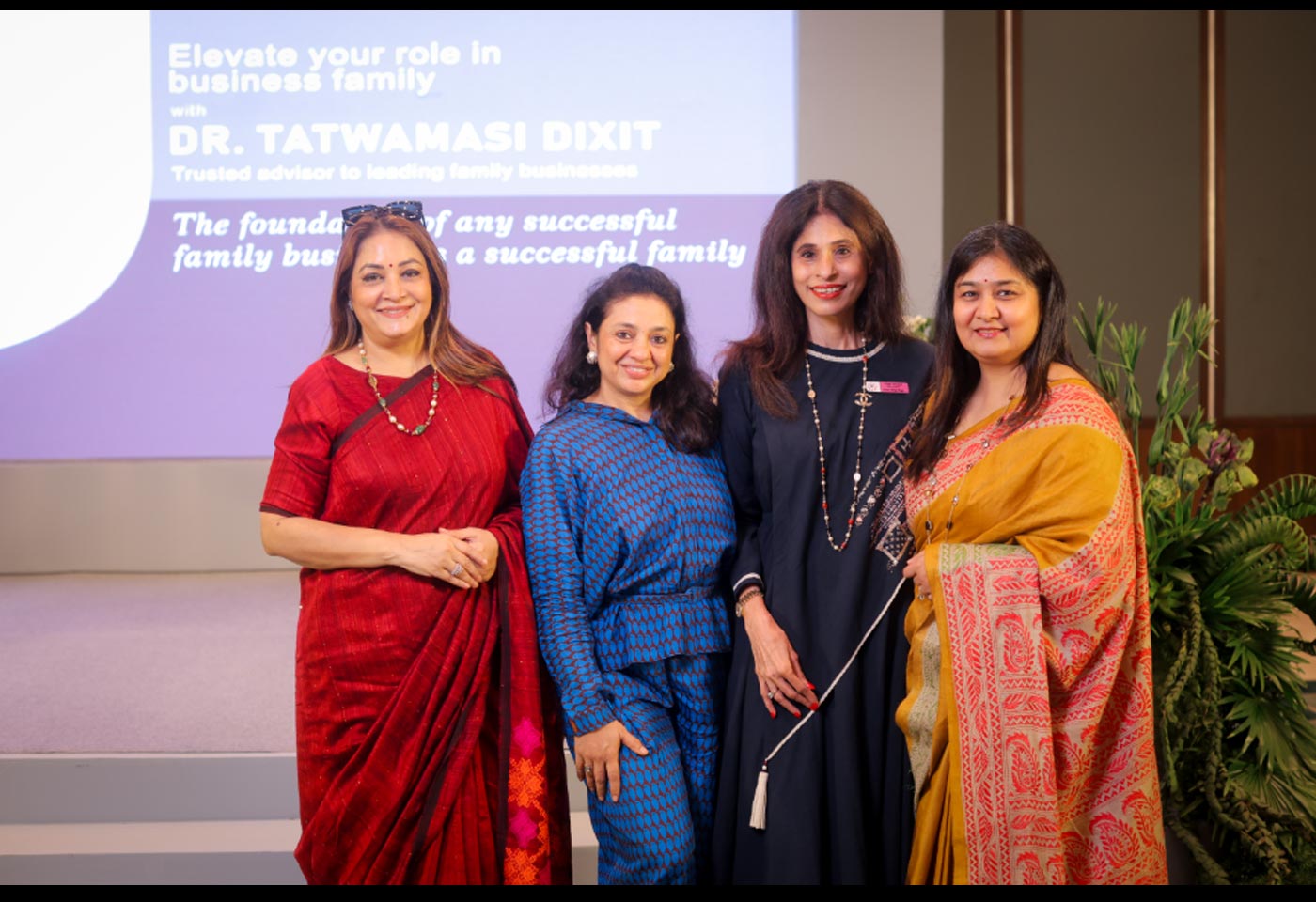
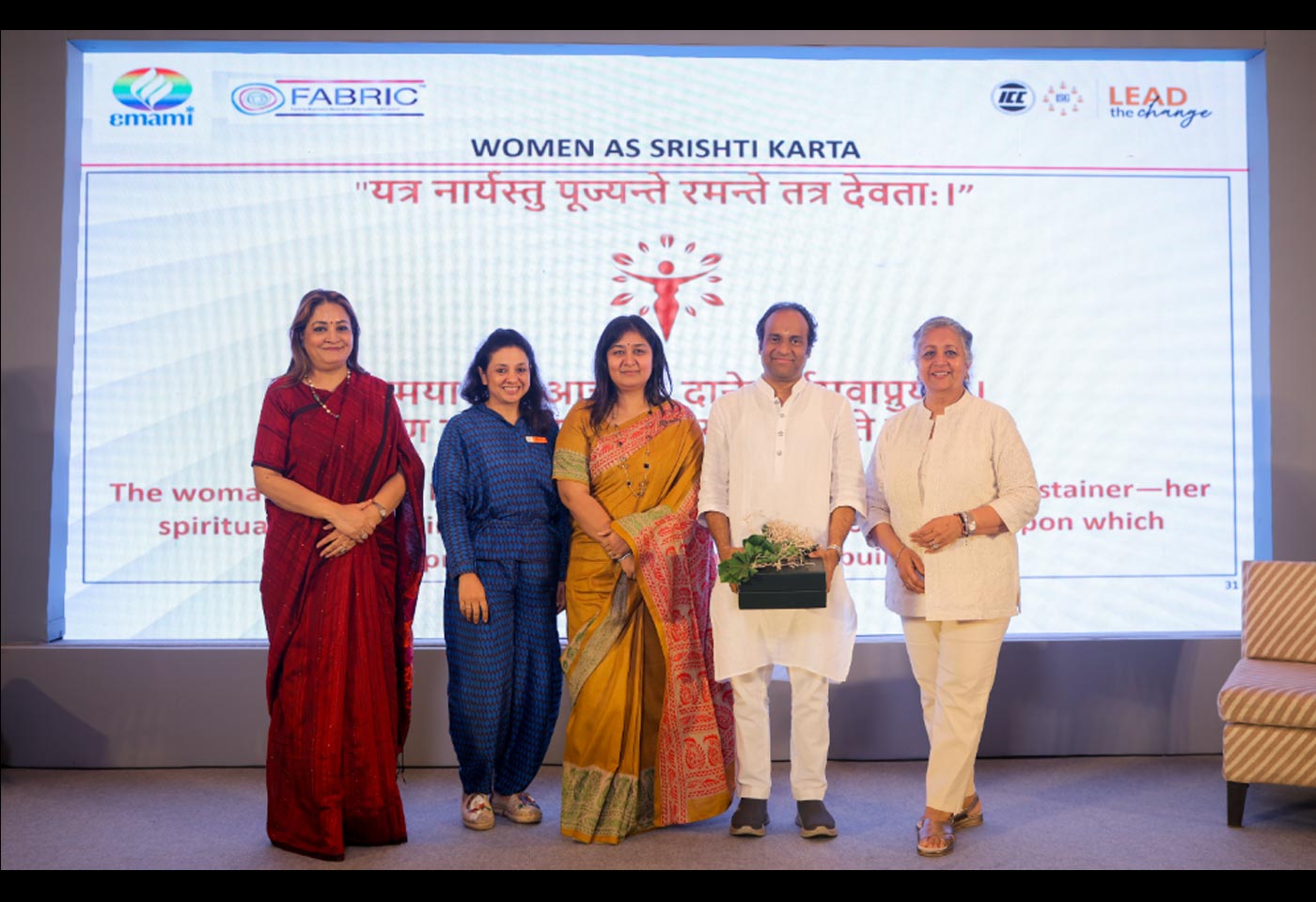
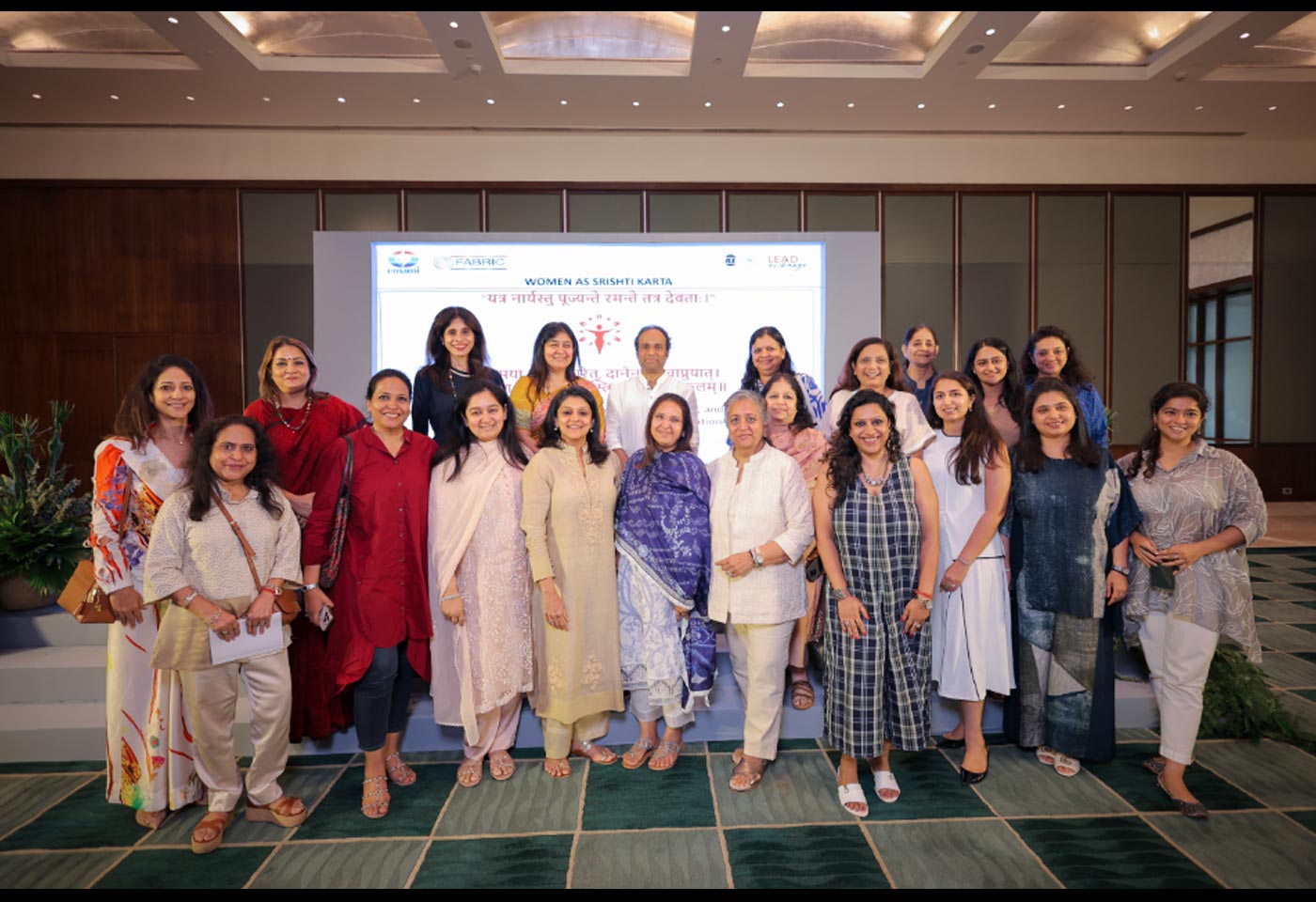
Speaker: LSG Kolkata
Venue: Bhutan
The Ladies Study Group (LSG) of the Indian Chamber of Commerce, Kolkata, embarked on a memorable delegation to Bhutan—an enriching journey of cultural discovery, leadership dialogue, and cross-border connection. Led by President Ms. Richa Agarwal, the visit reflected LSG’s 2025–26 theme, “Lead the Change”.
Over the course of two days, the group experienced Bhutan’s unique blend of tradition and mindful living—beginning with a traditional welcome, a walk through the Takin Preserve, and an insightful visit to the Royal Textile Academy. They explored heritage sites like the Great Buddha Dordenma and witnessed local craftsmanship at the handmade paper factory, all while engaging with Bhutan’s cultural and spiritual richness.
A key highlight of the visit was a meeting with the Honourable Prime Minister of Bhutan, Dasho Tshering Tobgay, who discussed mentorship opportunities between LSG members and young Bhutanese entrepreneurs, and encouraged Indo-Bhutan collaboration in business and knowledge exchange.
The trip was hosted with great warmth by Ambassador Sudhakar Dalela and Mrs. Namrata Dalela, who facilitated meaningful dialogue and cultural connection through special receptions at the Indian Embassy.
As Ms. Agarwal noted in her address, this journey was not just an external exploration but an internal one—into a nation where progress is measured not by GDP but by Gross National Happiness. The LSG returned inspired, with new friendships, ideas, and partnerships that reflect the spirit of shared growth and purpose.



















Speaker: Pujya Swami Chidanand Saraswati Ji and Pujya Sadhvi Bhagawati Saraswati Ji
Venue: Bengal State Room, ITC Royal Bengal
In a world seeking deeper meaning and inner peace, the president of Ladies Study Group Mrs Richa Agarwal, was deeply honoured to host an enlightening and transformative session with two of India’s most revered spiritual leaders HH Pujya Swami Chidanand Saraswati ji and Pujya Bhagawati Saraswati Ji from Parmath Niketan Rishikesh.
This event took place on the 26th of June at ITC Sonar Bangla bringing together members of Lsg seeking to explore the profound intersection between spirituality and religiousness.
Pujya Swamiji is the spiritual head and president of Parmath Niketan Ashram. He embraced a life of renunciation and has been guided by the motto “ in the service of god and humanity “ from a very young age. Swamiji is a powerful voice for interfaith dialogue, women’s empowerment and peace building.
Pujya Sadhvi Bhagawati Saraswatiji is also a globally respected author and speaker deeply rooted in the ancient wisdom of India. Sadhviji has a PhD from Stanford, and through her teachings has helped thousands connect with their true selves.
Anchoring the session with his trademark clarity and insight was Anand Narasimhan, a seasoned journalist, thought leader and eloquent communicator. He is the senior anchor at CNN News 18 with deep respect for Indian tradition and a keen curiosity about spirituality. Anand brought balance and depth to the conversation.
The event began with swamijis deep soft melodious voice chanting a prayer and taking the audience into a meditative state. As the last notes faded we were explained the meaning of a religious person. He urged us to stop thinking about “I” and to think about “We”. He said when I becomes We Illness becomes Wellness and religion is the journey from I to We. Pujya Swamiji and Sadhviji spoke about Dharma and how it teaches us to love our families and follow our sanskaars.
While Sadhvijis explanation of Sanatan Dharma opened our eyes to the eternal order of life, encouraging us to live in harmony, truth and compassion, Swamiji went on to explain the term Adhyatma and how we must all work on our inner selves to be peaceful and happy. He shared…“ engage yourself in Karma, under the shade of Dharma with the awareness of Brahma ”.
Together they reminded us that spirituality is not confined to rituals or religion, but is a lived experience one of love service and unity and how meditation is the only way to stay composed and grounded.
This special event ended with a very warm vote of thanks by Mrs Enu Bala the vice president of Ladies Study Group.















Speaker: Ladies Study Group
Venue: Kolkata Centre for Creativity
Over the course of two rich and reflective afternoons, "The Alchemy of Clay" brought together participants eager to explore not just ceramic techniques, but the inner landscapes shaped by creative engagement. Led by acclaimed ceramic artist Falguni Bhatt, the workshop offered an immersive introduction to sculpting expressive ceramic heads — from structure to surface decoration — in an environment that encouraged experimentation and mindfulness.
The session began with a warm welcome and introductory remarks by the President of the Ladies Study Group, who set the tone with a message that was as grounding as it was inspiring. She spoke of the workshop not as a pursuit of technical perfection but as a means of reconnecting with one's intuition, stillness, and the elemental power of earth. In her words: "Clay asks us to be patient, be present, and sometimes even playful... it allows us to lead the change — taking full control and responsibility of how we choose to shape it." She introduced Falguni Bhatt as not just a ceramicist, but a storyteller and nurturer, whose deeply personal art "doesn't shout; it invites." The President also acknowledged Ambica, who was unable to attend due to the joyful milestone of becoming a grandmother, and shared that a video message prepared by her would be played for the participants.
Enu Bala delivered a heartfelt Vote of Thanks, capturing the emotional texture of the two days. She expressed deep appreciation to Falguni Bhatt for her gentle, intuitive facilitation, which allowed participants to discover new dimensions of creativity. Enu acknowledged the President's inspirational leadership and made sure that her closing words resonated with gratitude, reflection, and a hope for more such soulful encounters through the Ladies Study Group.
Day One focused on hand-building the human head — beginning with basic forms and gradually moving to facial features and expressive texture. Using clay tools, found objects, and even their own fingers, participants explored proportion, stylisation, and surface exploration with playful curiosity.
Day Two allowed for refinement — from smoothing and joining to painting with underglazes and coloured slips. Participants learned to use brushes, sponges, and even fingertips to bring out tonal variation and emotional depth in their work. The session closed with a discussion on the firing process, tying together the ephemeral nature of touch with the permanence of clay once fired.
















Speaker: Devina Salarpuria and Sabina Rungta
Venue: Kolkata Centre for Creativity
In a candid and inspiring conversation with Sabina Rungta and Devina Salarpuria, Shalini Passi shared her journey marked by curiosity, creativity and inner resilience. She spoke of her passion for knowledge which became her foundation for making meaningful connections across diverse fields like art, architecture and culture.
Her love for art has been a constant and her journey as a collector began organically through personal interest in the works and stories of artists she admired.
Addressing perceptions of glamour, she shared that she has shaved her head a couple of times and didn't wear any jewellery for nearly a decade. Her wardrobe of only black and white during that period was a statement of clarity and detachment.
Ending on a note of strength and compassion, she emphasised that she believes in choosing peace over retaliation. For her, real power lies in restraint and grace.






Speaker: Rujuta Diwekar & Rekha Diwekar
Venue: Indus Banquet, JW Marriott
The Ladies Study Group commenced its 2025 - 2026 season under the leadership of President Mrs Richa Agarwal with an enlightening event titled “Food for Thought“ with renowned nutritionist Rujuta Diwekar, India’s best selling health author and her mother, Professor Rekha Diwekar, a heritage food expert and a promoter of Kitchen Chemistry. The talk was moderated by Mrs Richa Agarwal and Ms Chikki Sarkar, a prominent Indian publisher and founder of Juggernaut Books.
Rujuta, celebrated for her advocacy of traditional Indian dietary practices and Prof Rekha Diwekar, engaged the audience in a thought provoking discussion on the science and culture of food, advocating the importance of embracing local, seasonal foods and the wisdom embedded in India’s culinary heritage.
Rujuta’s sense of humour was a big part of the evening making her so engaging and relatable and she often used everyday analogies to break down complex nutrition myths and challenging fad diets.
This event set an empowering tone for LSG’s new term, aligning with Mrs Agarwal’s vision to foster knowledge sharing and cultural appreciation.
At the end of the event each member went home with a signed copy of Rujuta’s latest book ‘The Commonsense Diet’.
